October–December2022
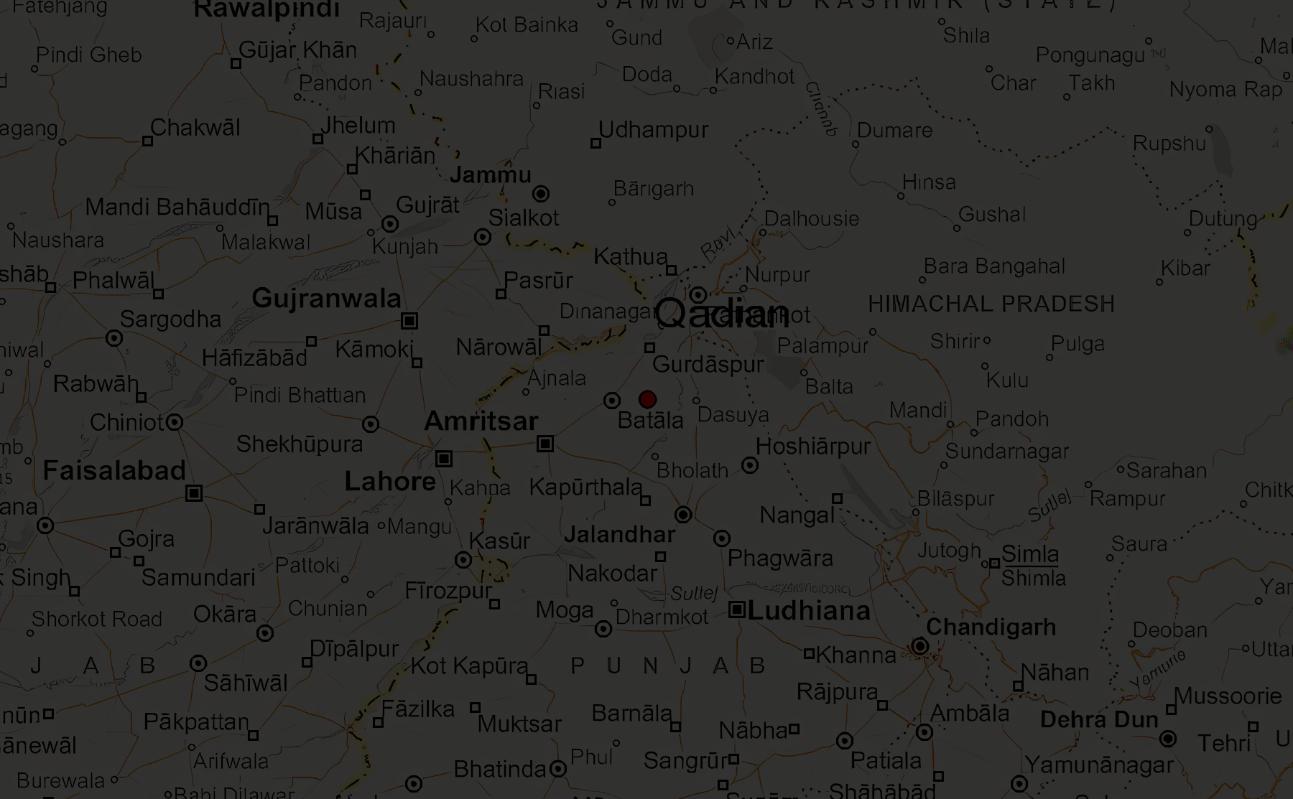


Issue44

Today the blessings of Allah are such that in several countries, there are thousands who a end the Jalsa Salana. Is this not a sign of the support of Allah the Almighty and proof of the fulfilment of the promises made by Allah the Almighty to the Promised Messiah (peace be upon him)? It most certainly is! If the eyes of those who make allegations and those who wish to turn away from the truth were not closed, this sign alone would be enough proof of the support of Allah the Almighty and the truthfulness of the Promised Messiah (peace be upon him).
h ps://www.pressahmadiyya.com/press-releases/2022/12/jalsa-salana-qadian-2022-concludes-with-faith-inspiring-address/
 Hazrat Mirza Masroor Ahmad, Khalifatul Masih Vaba, Jalsa Salana Qadian, 25th December 2022
Hazrat Mirza Masroor Ahmad, Khalifatul Masih Vaba, Jalsa Salana Qadian, 25th December 2022
From the Editor...
During the Waaqifaat-e-Nau UK virtual class with Hazrat Mirza Masroor Ahmad, Khalifatul Masih V (May Allah be his helper) on 15th May 2022, beloved Hazuraba, on observing the great number of Waqfe Nau Lajna members seated in Baitul Futuh, stated that a revolution must be brought about in the UK through their efforts. Revolution has been defned in the Oxford dictionary as ‘a dramatic and wide-reaching change in conditions, attitudes, or operation.’ As Waqfe Nau it is our duty to fulfl the instructions and expectations of our beloved Khalifah by striving to bring about a spiritual revolution within the Jama’at and within the wider society by attracting others towards the beautiful teachings of Islam Ahmadiyyat. This can only be achieved by frst improving our own moral standards.
Addressing the Waaqifaat-e-Nau about how to truly fulfl their waqf, Hazuraba stated:
“Your Waqf will only prove to be of beneft when those of you who are married carry out the tarbiyyat and training of your children in an excellent manner. Your Waqf will be benefcial only when you carry out even the smallest tasks and duties you are given with utmost satisfaction and happiness. Your Waqf will be of use only when your attire and clothing is according to the true Islamic dress code. Your Waqf will bear fruit only when you read and understand the Promised Messiah’sas teachings and then make it a part of your lives. Your Waqf will be benefcial only when you try to lead your lives according to the Qur’an and the Sunnah. And your Waqf will be truly benefcial when you establish a living connection with Allah the Almighty.”
(Address at the Waaqifaat-e-Nau Ijtema UK 2015 by Hazrat Mirza Masroor Ahmad, Khalifatul Masih Vaba)
May Allah enable us to fulfl our duties as Waqfe Nau and fulfl the expectations of beloved Hazuraba by bringing about a spiritual revolution Insha’Allah. Ameen.
In this issue of Maryam Magazine our readers can enjoy articles including ‘Emotions of Waaqifaat-e-Nau - Hazrat Khalifatul Masih V’saba tour of USA’, ‘Roles and Responsibilities of Waaqifaat-e-Nau Mothers’, ‘Zion – The Day the Duel was Won’ and ‘Waqf in the Field: Geography and Sustainability’.
ENGLISH EDITOR
Do you have any comments, suggestions or want your article featured in our next edition?
Email us at: chiefeditor@maryammagazine.org
CHIEF EDITOR
Zanubia Ahmad
ASSISTANT CHIEF EDITORS
Dure Jamal Mala
Nayla Muzamil
ENGLISH EDITOR
Hina Ahmedi
ENGLISH SUB-EDITOR
Hamooda Arif
EDITORIAL BOARD
Sabah Un Noor Tahir
Hibba-Tul Mussawir
Maleeha Mansur
Meliha Hayat
Salma Manahil Malik
Tahmeena Shamim Tahir
Mashel Chaudhry
Samina Yasmeen Arif
Amatul Wakeel Maha
Sameera Mirza
Kashifa Qamar
Safna Nabeel Maham
COVER DESIGN
Hina Farooqi
PAGE DESIGN & SETTING
Soumbal Qureshi
Naeema Amjad
Atiyya Wasee
Naila Fowad
Hina Farooqi
Zara Tahir Ahmad
PRINTED UNDER THE CENTRAL OFFICE WAQF-E-NAU MANAGER
Luqman Ahmad Kishwar PRINTERS Raqeem Press, Tilford UK
Hïñå Åhmëdï
Maryam | 1
03. The Holy Qur’an
04. Hadith
06. Writings of the Promised Messiahas
07. How Should Ahmadi’s pray for Khalifa-e-Waqt? | Words of Wisdom by Hazrat Mirza Masroor Ahmad, Khalifatul Masih Vaba
08. My Maryam Magazine Experience | Hina Ahmedi
12. Introduction to the Study of the Holy Qur’an | Recommended reading from the National Waqfe Nau Syllabus
15. Poem: Our Beloved Master | Syeda Zubariyah Anwar
16. Zion: The Day the Duel was Won | Tahmeena Shamim Tahir
20. Emotions of Waaqifaat-e-Nau | Munazza Khan
24. Kids’ Spread
27. Waqf in the Field: Geography and Sustainability | Amtul Noor Mahmood
32. Challenges of Motherhood | Words of Wisdom by Hazrat Mirza Masroor Ahmad, Khalifatul Masih Vaba
34. Roles and Responsibilities of Waaqifaat-e-Nau Mothers | Salma Manahil Malik
39. Laughter is the Best Medicine!
40. Experiencing the Blessings of Khilafat and Acceptance of Prayer | Mariya Rana
42. The Life and Character of the Seal of Prophetssaw

CONTENTS OCT - DEC 2022 | ISSUE 44
Maryam | 2
The Holy Qur’an
(Bani Isra’il:31-32)
Translation: Surely, thy Lord enlarges His provision for whom He pleases, and straitens it for whom He pleases. Verily, He knows and sees His servants full well. Kill not your children for fear of poverty. It is We Who provide for them and for you. Surely, the killing of them is a great sin.
(English translation by Hazrat Maulvi Sher Ali sahibra)
اكابرن ریبخہدابعبناکہناردقیوءاشینلقزرلاطسبی قباریصھؕزرننحنقلماۃیشخمکدلوااولتقتلو ممکایاو ھاالتقنمریبکاطخناک
Maryam | 3
Hadith
(Sayings of The Holy Prophet)
(May Peace and Blessings of Allah be upon Him)
(Ibn Majah)
Translation:
Hazrat Anas bin Malikra has narrated that the Prophet of Allahsaw said: “Respect your children and cultivate in them the best of manners.”
Explanatory Note:
Islam has defned the rights of parents over children and vice versa. On the one hand, it emphasises service and respectful behaviour to parents, and on the other, commands parents to treat their children with due understanding and regard, and to handle them in such a way as engenders in them feelings of dignity and self-respect and to attend to their education and training in particular, so that, when they grow, they may observe, with due propriety, their duties to God and to His servants and become pioneers of national progress. The truth is that no nation can make any progress, nay, no nation can escape degeneration, if its members do not leave behind their children in circumstances better
Respect Your Children and Give Them the Best Education عْْنأْْسناْبْن لْصْلوسرنعْثدحيْكلام اْىْْوْهْْیْلْعْمْْلْسْ ق:ْلاْنعْْ ْاْسنأْْ ْْصْلْاْىْْعْلْیْهْْوْسْللوسرْنعْثدحيْكلام أْوأْاومركبل ھْدأْاونسحأوْمكد :جت Maryam | 4
than their own. If every father was to see to it that he will leave his children better off than himself, both in knowledge and in practice, the nation must gain from strength to strength and will, by the grace of God, remain immune to the danger of decline. But it is a pity that most of the parents disregard this golden principle with the result that many children, far from being better off than their parents, are brought up, in such a condition as to give the impression of a dead baby having been born to a live person. Such parents feed and dress their children well and to some extent also mind their secular education, as it provides them with means of economic well-being, but they generally disregard their moral discipline as if it were something unimportant.
On the contrary, moral training or discipline is infnitely more important than secular education and certainly has a greater moral value and status. An educationally less qualifed but morally better disciplined person endowed with qualities of industry, truthfulness, honesty, self-sacrifce and pleasing manners, is far superior to the man carrying the donkey-load of knowledge but totally bereft of qualities of moral excellence. In the Holy Qur’an, the injunction: “Slay not your children,” [Surah Al-An’ām:152 and Surah Bani Isra’il:32] hints at the truth, that if you ignore inculcation of good moral qualities among your children and neglect their educational equipment, you will be virtually committing their murder.
The other portion of this Hadith, the one relating to showing respect to children, is of all the religious codes the distinctive feature of Islam; for, no other religion of the world has appreciated the point that without showing a proper measure of respect to children, high moral qualities could not be cultivated among them. Some foolish parents, in spite of loving their children, treat them evidently in such a low and vulgar manner, frequently indulging in abusive language, that their feelings of dignity, self-respect and self-estimation slowly freeze into death. This injunction of our Master (may my soul be dedicated to his service) is worthy of being written in gold letters. It enjoins that “children should be treated with considerateness” so as to equip them with dignity, self-respect and high moral qualities. Would that they valued this wise teaching!
(Hadith No. 15, Forty Gems of Beauty, p.78-80)

Maryam | 5
Writings of the Promised Messiahas
A FEW PRAYERS OF THE PROMISED MESSIAH AS

The Promised Messiahas said: “I have made it compulsory upon myself to make certain prayers on a daily basis. Firstly, I pray for my own soul that the Merciful Lord may use me for such work by which His honour and glory is manifested, and may He enable me to act in a manner that fully pleases Him. Secondly, I pray for the members of my household that may Allah the Exalted grant me the delight of my eyes through them and that they may tread the path of His pleasure. Thirdly, I pray for my children that they may all become servants of the Faith. Fourthly, I then pray for my sincere friends by name. Then, ffthly, I pray for all those who are a part of this community, whether I know them personally or not.”
“Alas! If only parents would spend as much effort in prayer as they do in seeking to punish their children, and if only they made it a constant practice to supplicate for them with a burning heart. Indeed, the prayers of parents for their children are blessed with special acceptance.”
The Promised Messiah (as), Malfuzat – Volume II, [Tilford, Surrey: Islam International Publications Ltd., 2019], 181
Maryam | 6
How Should Ahmadis pray for Khalifa-e-Waqt ?
Waqfe Nau children from Texas, USA were blessed to have an in-person meeting with Hazrat Khalifatul Masih V, may Allah be his Helper, at the Bait-ul-Ikram Mosque on 5th October 2022.
One of the children asked what supplications Ahmadis should offer when praying for the Khalifa-e-Waqt.
Hazrat Khalifatul Masihaba said:
“You should pray that Allah the Almighty helps the Khalifa of the time to discharge his duties – that the burden of the duties Allah has put on the shoulder of the Khalifa-e-Waqt is properly discharged. So, Allah gives him strength and health so that he works properly for the cause of Islam and Ahmadiyyat.
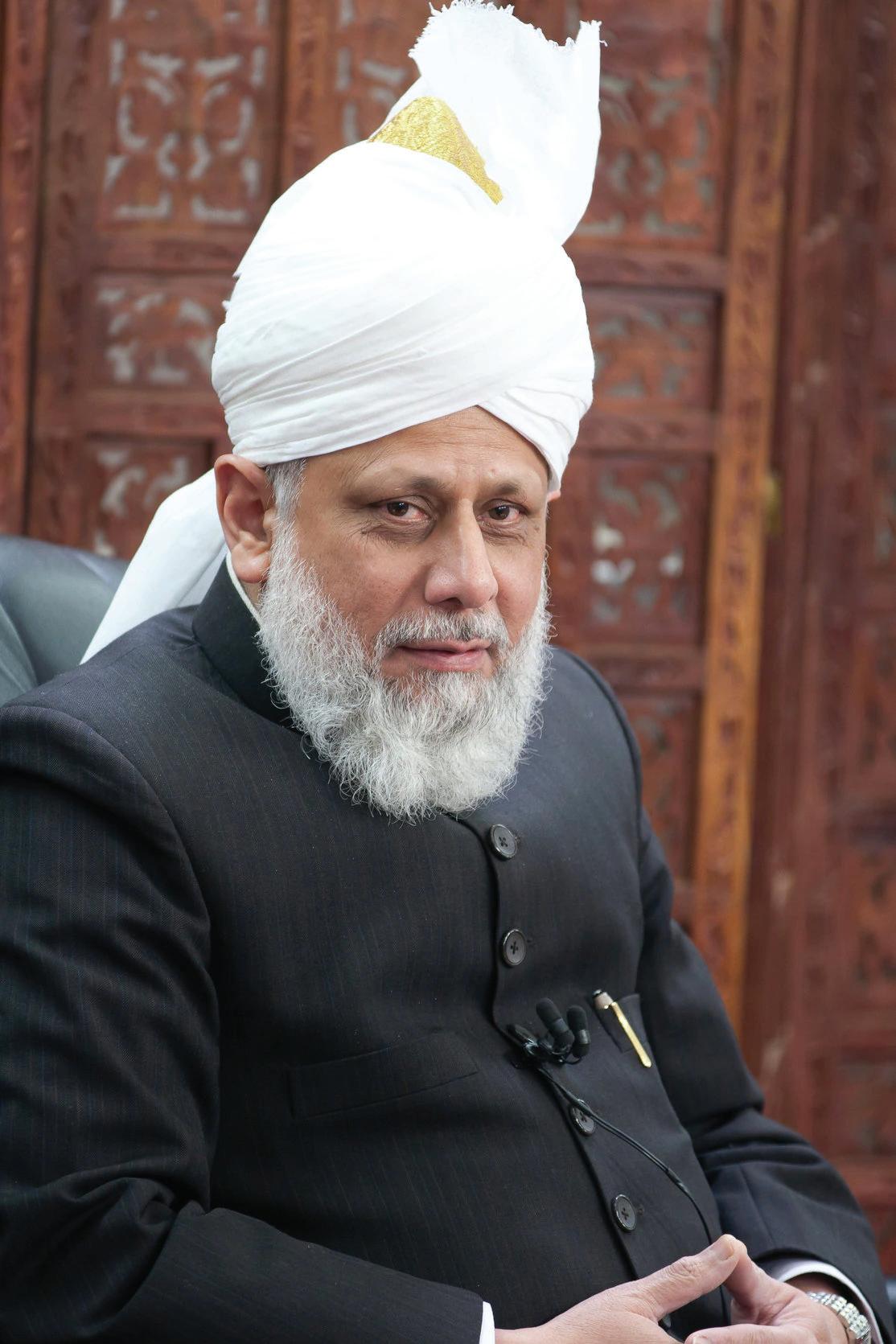

“And whatever the plans are in the mind of the Khalifa of the time, they are completed with Allah’s help in the shortest possible time and in the best way. And Allah the Almighty may also give him the helpers –that is Sultan-e-Naseer – so that a team of helpers can also help the Khalifa-e-Waqt. And Allah may also make us the helpers of the Khalifa of the time, so that, as waqifeen-e-nau, we also discharge our duties to help the Khalifa-e-Waqt in completing his assignments, tasks, wishes and plans.”
https://www.alhakam.org/muslim-youth-ask-the-khalifa-responds-usa-tour-2022/
Maryam | 7
My Maryam Magazine EXPERIENCE
Hina Ahmedi
2022 marked the 10th anniversary of Maryam Magazine’s first publication. In January 2012 Hazrat Mirza Masroor Ahmad, Khalifatul Masih Vaba graciously launched Maryam Magazine; the first ever central magazine for Waqfe Nau girls. By the Grace of Allah, I have had the immense honour of being a member of the editorial board since the inception of the magazine.

Maryam Magazine readers were blessed with a personally addressed letter by Hazur-e-Aqdasaba which highlighted the importance of being a Waqfe Nau girl, with Hazuraba drawing attention to Hazrat Maryamas - the first child to be dedicated by her parents for the service of God.
My educational background is in science; I studied BSc Biomedical Science at Kings College London. Towards the end of my degree, it was clear to me that my passion lay in proofreading, editing and publishing. With beloved Hazur’saba continual guidance and prayers, I was able to gain some work experience towards the end of my degree in a science media company which focused on checking the accuracy of scientific news which was being reported. After my degree, I was blessed to be

Maryam | 8
able to serve as a member of the Review of Religions team and become involved with writing scripts as a member of the Lajna MTA team. As a Waqfe Nau, the main purpose of my life is to serve the Jama’at in any and every capacity that I can and so I am immensely grateful to have had the opportunity to be a member of these teams. I believe that it was the blessings and experience I gained from both of these teams that also helped me to get a job in a scientific journal publishing company. This job enabled me to gain further experience in proofreading and editing articles and to learn a little bit about the background of publishing. These skills have helped me immensely in my role within the Maryam Magazine team.
Our first Maryam Magazine meeting was held at the Jama’at offices in Deer Park, London, and I still remember the feeling of excitement and anticipation as we discussed ideas for topics and designs for the magazine and were delegated assignments. I have primarily worked as a proofreader for Maryam Magazine, but have also had the opportunity to serve in various other capacities, such as designing simple files and writing articles.
(The team has very graciously been allocated an office for Maryam Magazine in Deer Park)

Maryam Magazine has a large board team who work together to source, research, write, proofread and edit articles for the quarterly publication. The prepared articles are then sent to our team of designers who give the magazine a professional and creative look, MashAllah. Our Editor in Chief, Zanubia Ahmad Sahiba has trained and guided the team over the years, advising us on which themes and topics are appropriate. She also keeps the team motivated to strive to improve our efforts for the service of the Jama’at. The Maryam Magazine team has been extremely blessed to have Hazur-e-Aqdas’saba prayers

Maryam | 9
and guidance at every step, through letters and Mulaqats with our Editor in Chief. It is extremely heart-warming and humbling to experience Hazur’saba love and attention to detail; despite his extremely busy schedule beloved Hazuraba takes precious time to choose from the cover designs sent by each of our designers and approves which of the covers should be used for each issue.

In 2015 Hazur-e-adqasaba graciously approved my name as the English Editor for the magazine and I have been serving in this capacity ever since. This role involves the organisation of each issue; our team has a meeting at the start of each issue to discuss a potential theme and decide on the topics for our regular files which include the Holy Qur’an file, Hadith, Writings of the Promised Messiahas, the Life and Character of the Seal of the Prophetssaw, Tarbiyyat page and Kids’ Spread. Titles and topics for other articles are then decided and we discuss potential writers for the articles and set a plan for contacting the relevant Waaqifaat-e-Nau to prepare and write the files within a deadline. Once articles are received and prepared, each article is read carefully and proofread by the editors and members of the larger editorial board. After the relevant edits are made, the files are sent for design. Our design team has grown and evolved through the years and is made up of very talented and dedicated Waaqifaat-e-Nau. A colour palette is chosen at the start of each issue and the designers use this for each article of the issue and include appropriate images and designs relevant to the article. Designed articles are then proofread again and once all of our articles are ready, our editorial board has another meeting to discuss the best order for the articles so that the contents page can be prepared. Finally, all the articles are sent to our lead designer to be compiled and then this is sent to the Central Waqfe Nau department for checking and printing.
Once printed, Maryam Magazine is distributed within the UK and internationally, additionally every issue is uploaded online for maximum readership. The Maryam Magazine team also distribute the magazine at Lajna and Waqfe Nau Ijtemas at the Maryam Magazine stall. The magazine is also available to read online at: waqfenauintl.org/resources/maryam/.
The Maryam Magazine team is made primarily of Waaqifaat-e-Nau; some of the team members are students, some are working professionally, some are married with children and many a combination of all of these. By the Grace of Allah, I have been blessed with three children; balancing my time between my family while also carrying out Maryam Magazine work has only been possible through the sheer Grace of Allah, with the support of our dedicated team members and due to the support of my husband and family. As it is the case that the majority of the team members have young children, our meeting times and working-hours are typically scheduled based on nap times, school pick-ups or in the late evening once the children are asleep and households settled! Managing my time between raising small
Maryam | 10
giving little denying basic obligations due to
UK2019 Hazrat his hand),
morals. People them. By doing brothers and
CHIEF EDITOR
Zanubia Ahmad
ASSISTANT CHIEF EDITORS
Dure Jamal Mala
Nayla Muzamil
ENGLISH EDITOR
Hina Ahmedi
ENGLISH SUB-EDITOR
Hamooda Arif
EDITORIAL BOARD
Sabah Un Noor Tahir
Hibba-Tul Mussawir
Maleeha Mansur
Meliha Hayat
Salma Manahil Malik
Tahmeena Shamim Tahir
Mashel Chaudhry
Samina Yasmeen Arif
Amatul Wakeel Maha
Ahmedi
beings; if has financial them…When one and sisters, kind to all of the circle of articles including ofPrayer over Exhibition’,‘ATribute to woman, Majesty a great irrespective hope to make a express Charles III, the
EDITOR your chiefeditor@maryammagazine.org
Sameera Mirza
Kashifa Qamar
Safina Nabeel Maham
PAGE DESIGN & SETTING
Soumbal Qureshi
Naeema Amjad
Atiyya Wasee
Naila Fowad
Hina Farooqi
Zara Tahir Ahmad
PRINTED UNDER THE CENTRAL OFFICE WAQF-E-NAU
MANAGER
Luqman Ahmad Kishwar
PRINTERS
Raqeem Press, Tilford UK
children and maintaining a high standard of work for the Jama’at is something that has taken time to learn and is a continuous process. Much pre-planning is needed before I can sit down at my laptop to check emails and start proofreading files; first I ensure my children have activities to occupy them that they can do independently, as well as making sure they have their snacks! As is the case with most children, my youngest, who is still very small, is of course, most curious about actual technology rather than his plastic toys and so often wants to sit on my lap and enthusiastically bash his chubby hands on my keyboard! Thankfully a decoy old remote control with no batteries in often distracts him, at least momentarily! There are times when I realise, I have been working for a stretch of time and my children are waiting for my attention, and although I definitely feel the mandatory guilt that all mothers feel, I know in my heart that I am a Waqifa-e-Nau and by the Grace of Allah my children are Waqfe Nau, so making this small sacrifice for the service of the Jama’at is my duty.I was fortunate enough to have grown up in an environment where I have seen both of my parents dedicated to serving the Jama’at. Therefore, for me,one of the greatest blessings of having the privilege to serve in the Maryam Magazine team is that I am able to explain to my children that I am busy with my Maryam Magazine work which I am doing because I am a Waqifa-eNau and am a helper of beloved Hazuraba and the Jama’at, just like they are and will grow up to be Insha’Allah.
I have experienced throughout my life that when you spend your time for the service of the Jama’at, you are showered with blessings in every aspect of your life. One ofthe many blessings of working within the Maryam Magazine team has been that I have been able to gain knowledge whilst reading articles. In Hazur-e-Aqdas’saba letter on the inception of Maryam Magazine,Hazuraba stated: “…you as the Waqfe Nau girls, are expected to keep the flag of knowledge and its application flying higher than any other standard.” Striving to fulfil the words of our beloved Hazuraba, we aim to include a wide variety of topics in Maryam Magazine including aspects of the Waqfe Nau syllabus,Taleem and Tarbiyyati topics,science,current affairs,arts and crafts to teach practical skills,additionally,we include stories and jokes –this ensures that there are articles for all of our Waqfe Nau readers of varying age groups.
Throughout my time serving in the Maryam Magazine team, I have written to Hazur-e-Aqdasaba requesting prayers for the magazine and that Allah the Almighty enables me to carry out my duties to the best of my abilities, as it is only with Allah the Almighty’s blessings and Hazur’saba prayers that I have had the honour of working as a member of the Maryam Magazine team.May Allah the Almighty enable me serve the Jama’at and May Allah enable the whole Maryam Magazine team to work with dedication to produce a Magazine that is a beneficial source of knowledge to all Waqfe Nau. May Allah accept our humble efforts and hide our faults. Ameen.
Maryam | 11
Introduction
To The Study Of The Holy Qur’an
Waqifeen-e-Nau are advised to read the book ‘Introduction to the Study of the Holy Qur’an1’. This is an inspiring introduction initially written as a prologue to the English translation and commentary of the Holy Qur’an. The first section, ‘General Introduction’, covers a wide range of topics concerning the need for the revelation of the Holy Qur’an in the presence of other religious books. The second section presents an excellent and affectionate life sketch of the Holy Prophetsaw of Islam – this chapter should be read as part of the Waqf-e-Nau syllabus2. The third section highlights the validity of the Holy Qur’an in contrast to any other sacred scripture and how it has remained preserved intact, free from interference and interpolation. This section includes topics explaining the compilation of the Holy Qur’an; some prophecies in the Holy Qur’an and how these have been fulfilled. It also presents the main characteristics of the Qur’anic teachings.
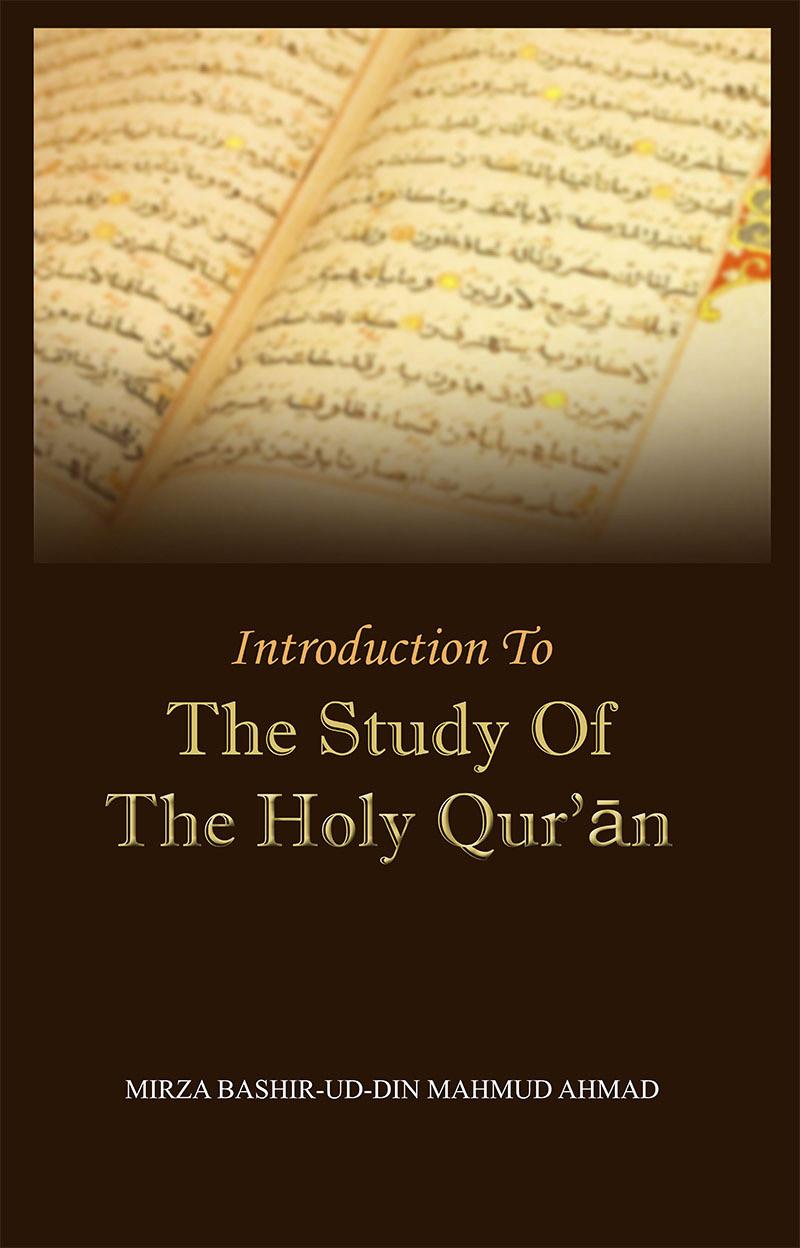
In this Issue of Maryam Magazine, we will be covering a few points from the ‘The Holy Prophet—A Life Sketch’ section.
At the time of the Holy Prophet’ssaw birth, what was the state of Arabia?
Even though Arabs were descendants of Abraham they practiced a polytheistic form of religion. They believed that certain human beings had a stronger connection with God and thus through them they could connect with Him. This way they combined the teachings practiced by Abraham as well as their own polytheistic views. Ordinary people were not able to connect with God therefore idols of holy people were made and worshipped. It is said that the Kaaba alone contained 360 idols!
The Arab world lacked intellect. Though they were devoted to their culture of speech as well as an interest in astronomy for logistical reasons their knowledge of history, geography, mathematics etc. was poor. Only a few people could read or write and no schools were to be found in Arabia. Their source of income was predominantly through trade in towns and most other parts of Arabia consisted of Bedouins who had no permanent abode. They earned through their farm animals and moved to different areas once water supplies fell short.
Drinking and gambling was a common practice especially for the rich. Men would entertain people with extravagant drinking parties up to five times a day. Gambling was in essence a sport for the Arabs. It was not done for money as the winners were expected to entertain their friends and gambling money was also used for funding during times of war. Crimes such as dacoity were common and attacking others was considered a birth right. However, the Arabs honored their word. Should someone seek protection from a leader, the leader was bound to protecting that individual. Good hospitality was a trait of the Arabs. If travelers were to come to Arabia, they would be welcomed and served the best food that could be offered.
Women in Arab society had no status to an extent that people would feel honored in burying or strangling newborn baby girls! Though, it is important to note that this practice was not common as if this was the case it would have led to the extinction of the race. Polygamous marriages were common practice and there was no limit as to how many wives a man could have.
MARYAM | 12
In times of war, the Arabs were brutal. They were not hesitant in mutilating the bodies of their enemies. The weak sides were made slaves who had no status in society. A master was entitled to do anything they liked with their slave – they would not be held accountable even for murdering them! female slaves were used for sexual desires and the children born through them were also treated as slaves.
It was in such times that the mercy of all mankind was born. He came at a time of darkness to guide the people to the light of Allah.
How did the Prophet’ssaw marriage to Hazrat Khadijahra take place?
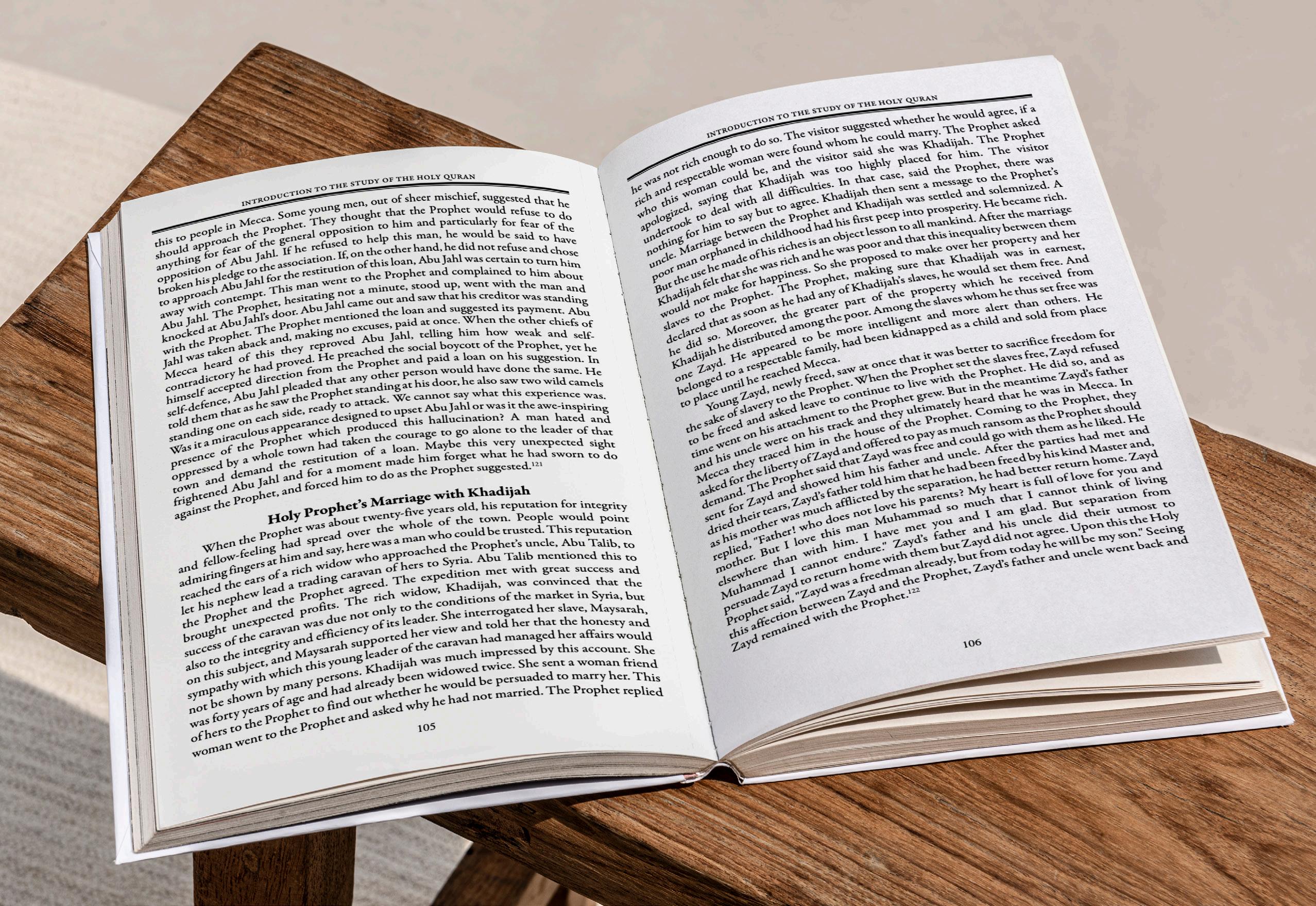
When the Holy Prophetsaw was 25 years old, he was known across Arabia for his integrity. Hazrat Khadijahra was a rich widowed trader. Upon hearing of his reputation, she approached the Prophet’s uncle, Hazrat Abu Talibra to let his nephew lead a trading caravan of hers to Syria. The Prophet agreed to do so. This expedition was a huge success and Hazrat Khadijahra was confident that this was due to the integrity and efficiency of its leader – the Prophetsaw himself. Hazrat Khadijahra was impressed by the Prophetsaw and sent a woman to him with a marriage proposal. At this time, she was 40 years of age and had already been widowed twice before. When the woman arrived with the proposal, the Prophetsaw apologised stating that she was too highly placed for him. Upon persuasion, the Prophetsaw agreed and Hazrat Khadijahra sent a message to the Prophet’s uncle
Hazrat Abu Talibra
The marriage of the Prophetsaw to Hazrat Khadijahra was settled and the once poor orphaned man had his first peep into prosperity. What was really spectacular about this was what he did with the wealth. Hazrat Khadijahra decided to give her property and slaves to her husband. The Prophetsaw set all the slaves free and the majority of the wealth was distributed to the poor.
Maryam | 13
When and how did the Holy Prophetsaw receive his first revelation?
The Holy Prophetsaw chose a spot – the cave of Hira, approximately two to three miles away from Mecca where he would go for meditation. Hazrat Khadijahra would prepare meals that could last several days which the Holy Prophetsaw would take with him. In this cave he would pray to Allah day and night. When he was 40 years old, he saw a vision. He saw a figure which was commanding him to recite. The Prophetsaw replied by saying he did not know how to recite. The figure insisted and the Prophetsaw then recited the following verses:
“Recite thou in the name of thy Lord Who created, created man from a clot of blood. Recite! And thy Lord is the Most Beneficent, who taught man by the pen, taught man what he knew not.” (Holy Qur’an, 96:2-6)
These were the first verses to be revealed to the Holy Prophetsaw which became part of the Holy Qur’an. In essence, the Prophetsaw was being commanded to proclaim the name of the One God and His message. After the Holy Prophetsaw received this revelation, he feared for the responsibility that was placed on him by Allah. After returning home, Hazrat Khadijahra saw that he was very anxious and restless. Upon questioning, the Prophetsaw narrated the story to her and stated:
“Weak man that I am, how can I carry the responsibility which God proposes to put on my shoulders?”
To which Hazrat Khadijahra replied:
“God is witness, He has not sent you this Word that you should fail and prove unworthy, that He should then give you up. How can God do such a thing, while you are kind and considerate to your relations, help the poor and the forlorn and bear their burdens? You are restoring the virtues which had disappeared from our country. You treat guests with honour and help those who are in distress. Can you be subjected by God to any trial?” (Sahih-ul-Bukhari)
Who were among the first people to accept Islam?
Hazrat Khadijahra accepted the Prophet’ssaw message upon hearing the account of his experience in the cave of Hira. Once the news reached Zayd – one of the Holy Prophet’ssaw freed slaves and his son Ali who was 11 at the time, they both accepted Islam. Hazrat Abu Bakrra, who was a close friend of the Holy Prophetsaw was out of town. Upon his return, he was told that his friend had gone mad and claimed he received a message from God through an angel. Hazrat Abu Bakrra trusted the Holy Prophetsaw blindly so he went straight to the Prophetsaw to enquire about whether this was true. The Holy Prophetsaw was hesitant in telling him as he feared he would misunderstand therefore tried to give a long explanation. Hazrat Abu Bakrra stopped him and asked him if it was true that an angel of God had descended upon him and given him a message from God. The Prophetsaw replied simply with a yes to which Hazrat Abu Bakrra accepted his message.
These were the people who were blessed to be the first to accept Islam; a woman, an 11-year-old child, a freed slave, a close friend and the Prophetsaw himself.
1 https://www.alislam.org/library/books/Introduction-Study-Holy-Quran.pdf
2 Syllabus Waqfe Nau Part 3 (Years 15-21), p.17 https://www.waqfenauintl.org/age-15-21/
Maryam | 14
OUR BELOVED MASTERSAW
I’ve been learning about this man, Who was born to a famous Arab clan, He came when the world was dark He brought light and made his mark
Mohammad was the name of our beloved He was also known as the truthful and trusted A brave, loyal and kind personThe best of the human version.

Allah chose him to be a prophet He led by example, humble and honest. He told everyone to submit, To One God we must commit.
He spread the message of Islam He taught us halal and haram. He said we must be modest, Never to sin or be dishonest.
The Holy Quran was revealed to him, A guiding light when the world was dim. Our beloved master was the finest teacherHe won hearts, the best preacher.
Before him, baby girls were buried aliveHe put a stop to this hideous crime. He was a champion for women’s rights He stood with the weak, a mercy for mankind.
I hope I can encourage all of you
To read about this wonderful man too. He inspires me to be a better Muslim I hope and pray I can be more like him.
Syeda Zubariyah Anwar, Aged 7
MARYAM | 15
ZION
The Day the Duel was Won
BY TAHMEENA SHAMIM TAHIR
Founded in 1900 by John Alexander Dowie (18471907), Zion is a city in Illinois, USA. Dowie was a Scottish-Australian minister known as a faith healer1. He started to follow his path as a man of faith in 1870 where he became a pastor in Alma, Australia2. After a personal experience of healing, he decided to follow the route of healing and established the International Divine Healing Association. This is where his journey began.
In 1888 he moved to the US, where he continued practicing healing, and in 1896 founded the Christian Catholic Church with its focus being spiritual healing. In 1900, the same year that Zion was founded, he declared himself Elijah the Restorer and First Apostle of the church. He created many rules; he forbade physicians’ offices, dance halls, theatres, drugstores, smoking and drinking 3

Dowie had radical beliefs, especially regarding Islam. In 1903, he wrote:
“How can anyone who knows exactly what Mohammedanism is, for one single moment imagine that God or man can forever stand that abomination? ‘Where the Moslem hoof comes no grass grows,’ is the Eastern proverb. Wherever the accursed teaching of Mahomet has come, there has been an end of all real progress. How can
Maryam | 16
there be progress when one-half the people are treated as spiritless beasts? The nation has no right to political existence that makes a religion of bestiality, and promises a heaven of harlotry to man —his reward being a number of peri or houri as paramours. The theology of Mohammedanism is that no woman has a spirit. The Mohammedan paradise is a palace where the satisfaction of a man’s dirty belly, his abominable passions, are the highest form of reward through endless ages. It is time that such an organized abomination as that should be swept out.”4
There are numerous texts about his bitter views on Islam, illustrating his main aim was to ensure Christianity conquered the world.
The Prayer Duel
Dowies’ radical views reached the Promised Messiahas in Qadian. As the true reformer the Promised Messiahas was, he did not shy away from responding. In the Review of Religions magazine and many other newspapers, the Promised Messiahas reached out to Dowie:
“As regards the Muhammadans, we hope Dr Dowie will renounce his claim upon all if the decision can be come to by an easier method. Whether the God of Muhammadans or the God of Dowie is the true God may be settled without the loss of millions of lives which Dr Dowie’s prediction would involve. That method is that without threatening the Muhammadan public in general with destruction, he should choose me as his opponent and pray to God that of two whoever is the liar may perish first.”5
“If Dr. Dowie assumes silence and gives no response to this offer, or if having decided to enter the lists he prays in his boastful manner and adopts the procedure herein recorded and then dies in my life-time, in either case it shall be a sign to the whole of America. Upon the manner in which death should take place, it is necessary to impose the restriction that it should not occur through human hands, but it may be the result of a disease, a stroke of lightning, snakebite, etc. The time-limit within which Dowie is at liberty to respond to this call is fixed at three months from the date that the announcement is issued. And we pray God that He may be with the righteous. Amen.”6
Maryam | 17
This formed the basis to the Prayer Duel. Newspapers around the world heard of this and thus Dowie was compelled to answer. He stated,
“There is one foolish man in India, a Mohammedan Messiah, who persists in writing to me saying that the body of the Christ is buried at Cashmir, in India, and can be found there. He never says that he has seen it, but the poor, fanatical and ignorant creature keeps on with the raving that the Christ died in India. The Christ reascended into the heavens at Bethany, and He is there in His Celestial Body.”7
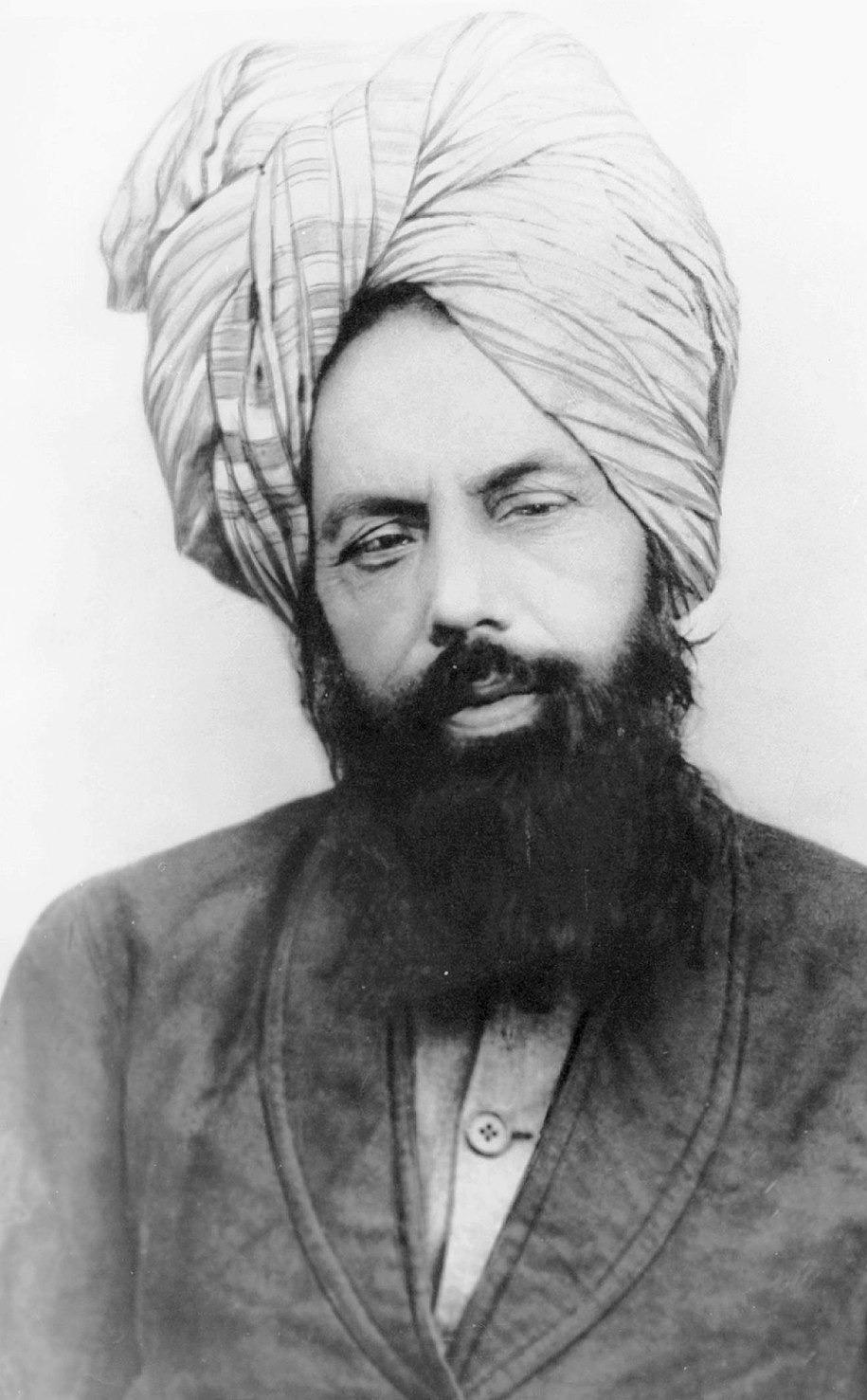
Initially Dowie didn’t reply to or accept the challenge, and whilst explaining this to his congregation he likened the Promised Mesisiahas to a gnat, that he could “crush out their lives… I give them a chance to fly away and live”.8
There was no reply from Dowie for over a year and the Promised Messiahas wrote to him again:
“Dowie has not so far replied to my challenge, nor has he referred to it in his paper. I, therefore, grant him time for seven months from today, the 23rd of August 1903. If during this period he comes forth in opposition to me and makes an announcement in his paper that he accepts fully the plan that I have put forward, the world shall soon see the end of this contest. I am about seventy years of age and Dowie, according to his own statement, is a young man of fifty years. I am not concerned about this disparity in our ages as the issue is not to be decided on the merits of age. It rests entirely with God Who is the God of heaven and earth and is the best Judge. If Mr Dowie runs away from this contest, I would call upon the people of America and Europe as witnesses that this would also be deemed to be his defeat, and in such case, it should be concluded that his claim of being Elijah is a mere boast and deceit. He may try to flee from death in this manner, but he should realise that his flight from the proposed contest is also a species of death. Be sure, therefore, that a calamity will most certainly befall his Zion very soon.”9
Maryam | 18
And so, the fall of Dowie began. So many issues started to occur for Dowie. In a nutshell,
• The City of Zion became bankrupt, and even in debt
• Dowie fell ill and was suffering hallucinations
• He lost most of his followers after spending an absurd amount of money on world tours
• His wife and son also left his side
• His health started to deteriorate drastically
On 9th March 1907, Dowie died at his house in Zion City. His mental state at the time was poor. His intention was to be buried in a lavish mausoleum with all other family members, but because of his actions and dishonoring his family, he only has a simple stone with the name “John Alexander” engraved to make his burial place. His son was so ashamed of the actions of his father that he did not want the name Dowie to be remembered.
The Prayer Duel truly won
On Tuesday 27th September 2022, Hazrat Mirza Masroor Ahmadaba laid the foundation stone of the minaret for the Fath-e-Azeem Mosque in Zion. Hazrat Mirza Masroor Ahmadaba also unveiled a plaque to mark the opening of the Mosque. For a mosque of the Ahmadiyya Muslim Community to be built in the hometown of Dowie, the one who despised Islam, would once have been unthinkable. With the prayers of the Promised Messiahas, the unthinkable and at one time seemingly impossible has become a reality, Alhamdolillah. This Mosque will stand as a true reminder of the triumph of the prayer duel between Hazrat Mirza Ghulam Ahmad, the Promised Messiahas, and Dr Alexander Dowie.

1 https://en.wikipedia.org/wiki/John_ Alexander_Dowie
2 https://www.britannica.com/ biography/John-Alexander-Dowie
3 https://www.britannica.com/ biography/John-Alexander-Dowie
4 Leaves of Healing, 14 February 1903
5 The Review of Religions, September 1907
6 The Review of Religions, vol. 1, no. 9, September 1902, pp. 349
7 Leaves of Healing, 27 December 1902
8 Leaves of Healing 27 December 1902
9 Majmū’ah Ishtihārāt, vol. 3, pp. 619620; Ahmadiyyat: The Renaissance of Islam, p. 101
Maryam | 19
Waaqifaat-e- Nau EMOTIONS OF

Hazrat Khalifatul Masih V’s (May Allah be his Helper) tour of USA
By Munazza Khan, Maryland, USA
Members of the USA Jama’at were recently blessed with a visit from Hazrat Khalifatul Masih V (May Allah be his Helper). Spirits were high as Jama’at members travelled to Zion, Dallas and Maryland to meet with their beloved leader.
USA was the first country Hazuraba was visiting after the Covid-19 pandemic, so naturally emotions were raw as the desires of pining hearts were being fulfilled. The sounds of passionate slogans being raised and the beautiful recitation of rehearsed Taranas as Hazuraba walked past followers will forever remain etched in our memories for a lifetime.
Young and old would run to get a space behind the security barriers to catch a glimpse of their beloved Hazuraba. “Assalamo Alaikum pyare Hazur” “We love you Hazur” “Naray Takbeer” some would say over and over until they lost sight of their Khalifa. Others would be holding back tears of happiness and gratefulness behind their masks. As the phrase “you just had to be there” goes, it is a very difficult task to put these feelings into writing. For our readers I can only try my best to share the emotions members of the USA Jama’at felt through this article.
Maryam | 20
We were told during Hazur’saba visit only those would be granted a personal mulaqat who had previously never met with Hazuraba or who had not had a personal mulaqat with him in the last 15 years. The Waqifeen-e-Nau were however graced with the opportunity to have classes with beloved Hazuraba at Baitul Ikram Mosque Dallas, Texas on 5th October 2022 and on 12th October 2022 at Baitur Rehman Mosque, Silver Spring, Maryland.
Some Waaqifat-e-Nau were interviewed prior to their classes.
“To have this one-on-one with Hazuraba, after the pandemic, it feels like a dream right now,” said Sajila Ahmad from Houston.
Samira Sohail from Seattle said she felt very nervous but also very blessed for such an opportunity. “I have not met Hazuraba in over 10 years and I did not expect this opportunity to come so quickly especially after COVID, Alhumdolilah.”
Ramia Chaudhary travelled a long way to see her beloved Khalifa: “I have been praying to see Hazuraba, it’s been 12 years since the last time I saw him. I travelled just to meet Hazur.”
Monifa Imaan Tariq (Dallas), Syeda Qaseema Sadaf (Chicago), Maheen Waraich (Austin) and AmatulHaleem Zayn-Wahab Karim (Indiana) all expressed that despite feeling nervous to be present in front of Hazuraba they were all overjoyed to be in his presence. “You have so much respect and reverence for Hazuraba, you don’t want to make a mistake or say the wrong thing,” said Zayn.
It is imperative that every girl should rehearse their presentations or questions at least 10 times, said the organisers before the Dallas class. Witnessing their jitters and worrying faces, I could only advise them to smile and enjoy their personal moment with their beloved Hazuraba because that is what they had travelled here for.
It was clear from the impressions of the Waaqifat-e-Nau interviewed post classes that a wave of relief and happiness had engulfed them having seen their beloved Khalifa and receiving direct guidance from him in their personal pursuits.

During rehearsal, a couple of the girls even had a follow up question to their original one, in case they wanted further clarification. Observing from the back of the classes as floor manager, I witnessed how these girls didn’t even need to ask their follow up questions as Hazuraba provided such clarity from his detailed responses, leaving no room for doubt or uncertainty in the minds of the girls. Dear Hazuraba knows the state of our hearts without us even having to disclose anything. That is the true sign of a Divine man. Subhanallah and Alhamdolilah for Khilafat.

Maryam | 21
Post class Impressions of Waaqifaat-e-Nau:

During Hazur’saba tour, every member serving in their own capacities was carrying out their work with such passion and zeal, it was truly remarkable.
As soon as the classes were over, we were told to collect impressions from the Waaqifat-e-Nau straight away so it could be sent to Markaz. The dedicated members of the impressions team got straight to work recording interviews which were compiled into a report overnight and submitted in the early hours of the morning.
“No matter how many mulaqats I’ve had with Hazuraba, it feels magical and special each time,” said Nawal from North Virginia.
Husna Ahmad Mirza from Los Angeles said: “I’m feeling amazing, it was so refreshing being in Hazur’saba presence, this was very much needed and I’m extremely grateful to be a Waqfe Nau right now and being in his presence. We prioritized him and he prioritized us as Waqfe Nau.”
Amatul-Haleem Zayn - Wahab Karim from Indiana Jama’at said: “I was very grateful for the opportunity to be in the presence of beloved Hazuraba and I felt like I benefited from everyone’s questions, for example someone asked how to raise children and even though I don’t have children Inshallah I’ll remember this advice. When I was asking my question to Hazuraba, someone’s head was blocking my view. Beloved Hazuraba trying to see me (while I was simultaneously trying to see him) made me feel how he reciprocates the love we have for him. For Hazuraba to make an effort like this (shifting over in his seat) just so we could see one another, I was truly touched and humbled.”
Razia Tabassum from Maryland recalls her feelings: “I remember precisely the moment beloved Hazuraba walked in. The entire hall was completely silent, on edge with nervous excitement. As beloved Hazuraba entered the hall, we could hear the rustling of his Shalwar Kameez, and the revealed words (same ones displayed on the banner outside the mosque) came to my mind instantly “Wo Baadshah Aaya”The King has arrived.
Then, beloved Hazuraba sat down and pleasantly addressed all of us, which greatly helped to reduce the built-up nervousness.Ihadtheblessedopportunitytoaskaquestionregardinghome-schoolingchildren,whichbeloved Hazuraba answeredwithsuchwisdomandfarsightedness,thatitclearedalldoubtsandreservationsinmymind.”
Maala Sabah Noor from Los Angeles said: “The feeling of being present with Hazuraba was amazing and memorable. Being able to see him, having him guide us irst hand and just being there attentively really made an impact on me as a Waqfe Nau and as an Ahmadi Muslim.”
“I feel like I learned a lot more by attending this class! The feeling of getting the answer of my question from him directly makes me know that I am getting the correct and thoughtful answer,” said Amtul Noor Ridaa, Los Angeles.
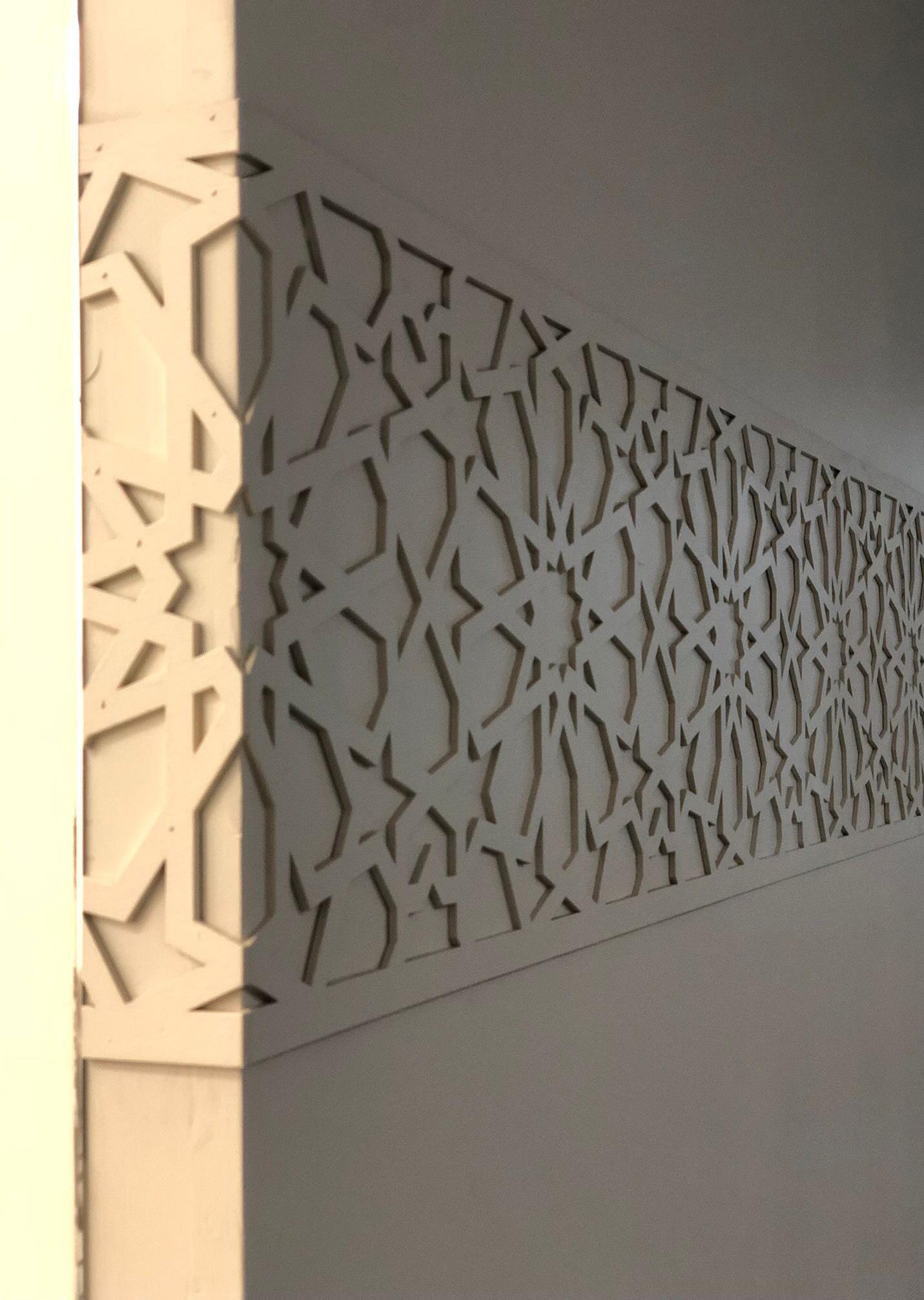
Maryam | 22
Shafia Hamid from Long Island said: “When you have a meeting with Hazuraba, the only thing you focus on or hear is Hazur’saba voice. It is a very special and amazing feeling when you know that he’ll never forget you and remember you in his prayers.”
Hiba-tus-Sabooh Haroon Malik from Oshkosh said: “Before the class I felt really nervous but when the class started, I felt calm because Hazuraba made it really easy, he was laughing with us. But then I felt a little nervous. I would look up at him and he would be looking at me so I would look down because I was told not to stare, but when I was asking my question, I couldn’t look away. I haven’t had much interaction with Hazuraba so I wanted as much interaction with him as I could. It was a really nice experience.”
Labeena Kadir was full of happy emotions. The joy in her voice was heart-warming so a voice recording was made. Here is a transcription of her thoughts: “The class was very beautiful; I was in the front row and I loved how he made eye contact with everyone. In the first few minutes when he first came in, he made the atmosphere very clear like if there was anyone that was nervous, he calmed them down. It was so beautiful. It was so calm. Whenever you looked at him you would get this warm inner feeling. If you felt uncomfortable and on edge and if this was the first time you’re seeing Hazuraba, thinking you’re going to mess up he just cleared up the atmosphere. I even had my own instinct of running up and hugging him but I had to stop myself. He was so friendly, nice, calm, beautiful and what he said was
really really guiding. All of the questions I had were all cleared because of what he said and he really made sure that we really understood what he said.
She was asked, what was the biggest question on her mind that Hazuraba answered without her even asking?

“There was a question asked on the Tarbiyyat of boys, are there any unique features that you need to give a baby boy? Hazuraba said to do what’s necessary, pray for him, even 2 nawafil, also read the Qur’an. There was also a question about girls going out with friends, I’m growing up in my teenage years, there’s going to be a time where it’s awkward for me so he really cleared that up for me.”
The emotions of host Jama’at members was indescribable, their Masjids and their towns were illuminated with the presence of the Khalifa-e-Waqt and many expressed that it brought them closer to Khilafat in a way they did not expect it to.
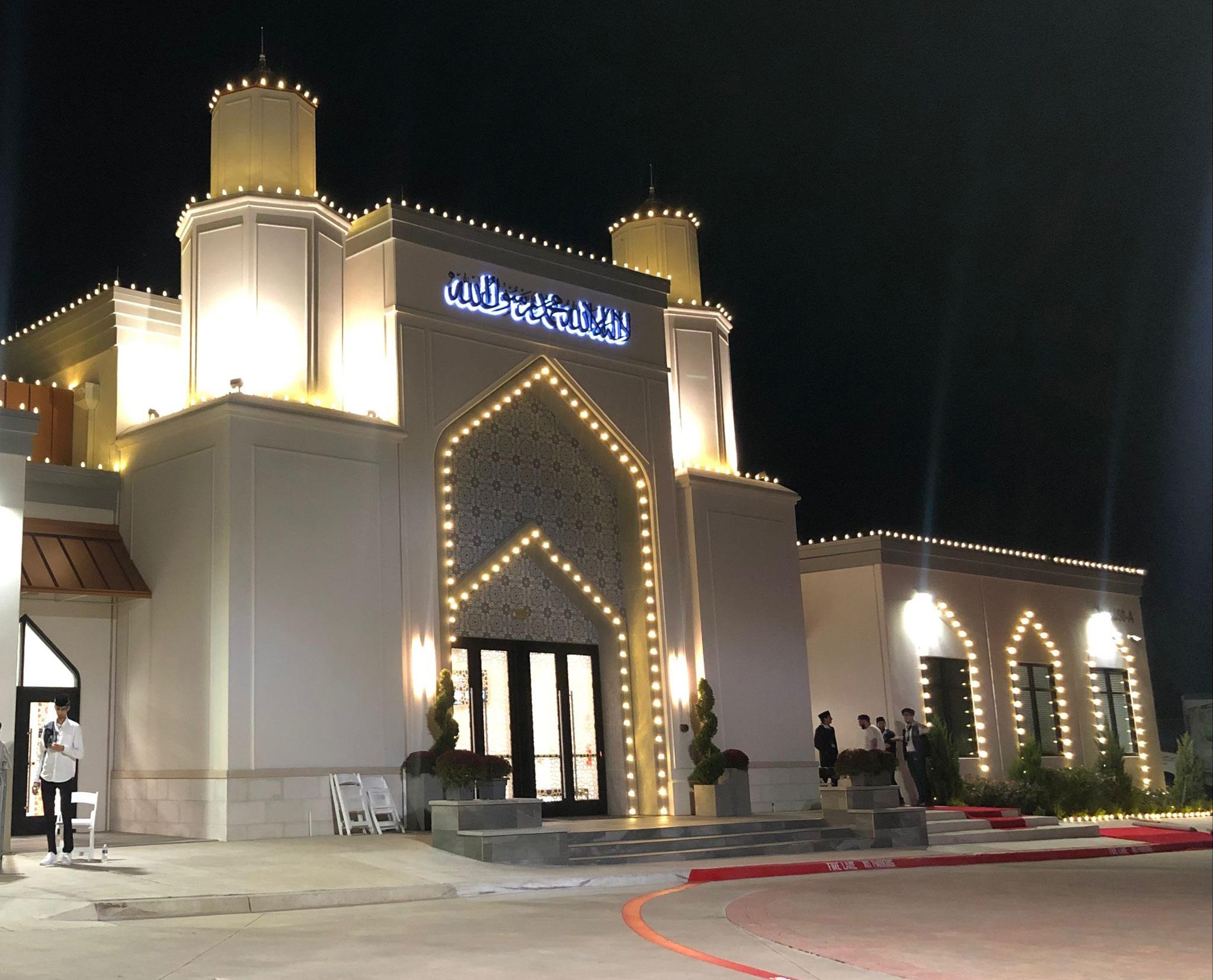
“I feel very happy and blessed for this opportunity. It feels unreal. Meeting Hazuraba in this setting, especially in my own Masjid, made me more motivated to be a better Ahmadi Alhamdolilah ,” expressed Shafia Ahmad from Dallas Jama’at.
May Allah continue to increase the love of Khilafat in our hearts and enable us to serve our roles as Waaqifaat-e-Nau to the best of our abilities. We yearn for the day our beloved Hazuraba will visit the USA once again Insha’Allah
Maryam | 23
Kids’ Spread
(Taken from the National Waqfe Nau Syllabus)
ATTRIBUTES OF ALLAH
Match the attribute of Allah to the correct meaning. Develop a habit of praying using these attributes.
The Gracious Ar-Raheem Lord of All the worlds Al-Ghaffar
The Master of the Day of Judgement As-Samee
The Merciful Ar-Rahman
The All-Hearing Al-Aleem
The All Knowing
Rabul-Aalameen
The Ever Forgiving
Maaliki Yaum-id-Din
Maryam | 24
ABLUTION

Below are the 7 steps of carrying out ablution in the wrong order. Correct the order by writing the correct step number in the box.
Wash the face three times
Wash the forearms including the elbows three times (right arm first and then left).
Wash the feet including ankles, three times; the right foot first and then the left
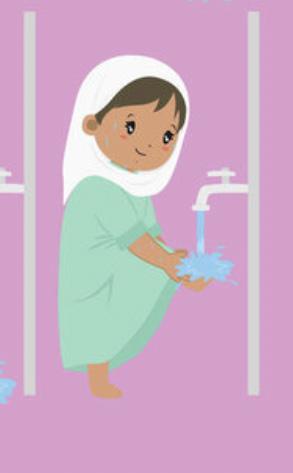
Clean your mouth by rinsing it with water three times, massaging the gums at the same time.
Clean the nostrils thoroughly by putting some water in them.

Wash your hands three times up to the wrist; the right hand first and then the left. Moisten the hands and run them over the head from front and top down to the neck, then run the thumbs around the ears and wipe inside the ears using index fingers.


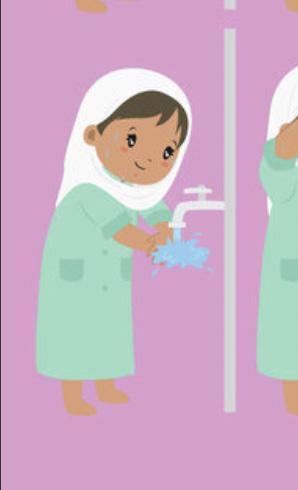

Step

Maryam | 25
ETTIQUETTES OF GOING TO THE MOSQUE
Circle the correct option from the two options in bold to complete the sentence:
One should be physically clean as well as wearing clean / dirty clothes when going to the mosque.

Step into the mosque with the right / left foot first, and recite the prayer while entering the mosque.
Upon entering, greet the people already in the mosque with Assalamu Alaikum. Do it in an appropriate / loud volume.

On arriving, if possible, offer two / six nawafil. These are called TahiyyatulMasjid.
Do / do not go to the Mosque after eating onion, garlic, radish or other strong smelly foods.
It is forbidden to walk in front / behind of someone who is praying.

The front rows should be occupied first / last. Those coming in late should not attempt to reach the front by disturbing people already seated.
Shoes should be put at the appropriate place such as in a shoe-rack. You can / cannot walk with shoes in the area designated for worship.
When leaving the mosque, say Assalamu Alaikum. Put the right / left shoe on first. Step out of the mosque with the right / left foot first.

Maryam | 26
Waqf in the Field:
Geography and Sustainability
 By Amtul Noor Mahmood
By Amtul Noor Mahmood
Maryam | 27
As a child I would usually gravitate towards the science-based subjects at school. I would be curious about the inner workings of the human body and how each organ served a purpose to keep us alive. I would also be very interested about the science behind animals; I loved them so much that in primary school I wanted to be a veterinarian. Fast forward to secondary school, I still absolutely adored science and at that time I was thinking to perhaps explore a career in medicine. However, I dropped that idea later on as I thought it might be too restrictive for me.
When I was applying to university, I was so confused as to what I should apply for. This was because I had a few interests, and I am usually an indecisive person. I was quite interested in science, charity and helping people and animals so I wanted to do something where I could merge these. A field that is everevolving, exciting and encourages one to learn more and more. After my A-levels (where I studied Maths, Chemistry and Sociology) I became so fond of preserving and protecting the environment, I felt that not a lot was being done to appreciate the nature and wildlife in our world. Even though as humans we are the real perpetrators, we also have so much power to conserve our environment.
Fortunately, as a Waqifa-e-Nau, I know that my life is dedicated to serving the Jama’at and spreading the word of Islam and Ahmadiyyat. What better way to do this then through my education and career? Through the Jama’at I am able to seek the guidance from Hazuraba on all areas of my life via letters and mulaqats. Hazuraba has always placed a great emphasis on Waaqifaat-e-Nau practicing a career in teaching, medicine, and research. Luckily in a mulaqat I was able to ask Hazuraba about what I should be pursuing at university. Hazuraba asked me what my interests were, to which I replied ‘Environmental Sciences and the protection of nature and animals’. Hazuraba approved my interests and encouraged me to study this as Hazuraba too had studied Agriculture was a similar field. Hazur’saba passion lay in the protection and cultivation of plants and flowers and so he understood my passions too.
With Hazur’saba blessings and guidance I applied for a degree in Environmental Management and Ecology at various universities and subsequently enrolled at the University of Hertfordshire. My degree was a pathway among many in the geography department, and in my first year I decided that the Ecology aspect did not excite
Maryam | 28
“Hazur’saba passion lay in the protection and cultivation of plants and flowers and so he understood my passions too.”
me, so I switched to Geography in my second year and then I specialised in Human Geography in my third year. Having not studied Geography for GCSE’s and A-levels I did find some modules and topics challenging, and for the most part I taught them to myself. However, till this day I am so glad that I kept changing pathways to find the one that I was most passionate about. This is because Human Geography amalgamates fragments of every subject and is extremely applicable in understanding societal issues. Some topics that we covered in third year were Urban Social Geography, Planning and Development, Solving Environmental Problems, Geopolitics, The Global Energy Challenge, Climate Change and Environmental Governance.
The third year of university was the most challenging but also the most rewarding, this is because I was so enthusiastic about my dissertation which was on the geographical implications of fast-fashion. I was adamant that the fast-fashion industries were producing mass waste and were underpaying their workers, so I wanted to study the public’s perceptions on this topic, which I determined through interviews. During my time doing my BSc, I would regularly write letters to Hazuraba asking him for guidance; I received replies filled with prayers and reassurance.
By the end of third year, I knew that I was most curious about Sustainable Development and that I wanted to pursue a career in this sector to help society and specifically those in less developed countries. According to the Brundtland Report, Sustainable Development is defined as the “development that meets the needs of the present generation without compromising the ability of future generations to meet their own needs”. It dawned on me that the Earth’s resources are finite and will run out one day. The destruction of habitats, global warming, climate change and plastic pollution are all human induced, so we as a society need to produce solutions to rectify what we have
so that future generations can live comfortably.
Therefore, I wanted to study this further as it would lead me to a progressive, rewarding, and dynamic field. A field that is ever-evolving, exciting and encourages one to learn more and more. I decided to study for a Masters in Sustainability and Management at Royal Holloway University in London and during my studies by the grace of God I managed to gain a part-time position as a research assistant at my
done,
Maryam | 29
“The destruction of habitats, global warming, climate change and plastic pollution are all human induced, so we as a society need to produce solutions to rectify what we have done, so that future generations can live comfortably.”
university. In my personal statement I wrote about what I wanted to do with the knowledge I gained from my degree. I stated that I wanted to help different countries all over the world, paying specific attention to third world countries who urgently need to adopt daily sustainable practices due to a dearth of natural resources and impoverishment. I mentioned Pakistan as being one of the countries that I want to aid by improving living standards and mitigating/ reducing natural disasters which were so prevalent, like flooding.
This is where I put the skills that I acquired from writing two dissertations to the test and felt like a professional academic researcher. After I had completed my Masters, my university offered me the same position but full-time, which I was extremely grateful for.
The work that I was doing was looking at the factors influencing antimicrobial use in dairy cattle in India. I was in charge of writing up a systematic literature review by analysing interviews and looking at the dietary trends in India and how Hinduism influenced it. The three main areas that I was focusing on were the socio-economic factors, management factors, and climatic/environmental factors that influenced antimicrobial use in dairy cattle in India. I had never written a systematic literature review before, I only had experience in writing literature reviews, so I learnt on the job and taught myself through YouTube videos and guidance from my professor. I also learnt how to screen hundreds of articles through a software and how to summarise and synthesis key information from these articles. It was a phenomenal opportunity for me to learn about how articles are created and published, and how many research organisations are involved in one project. I was working with professors and research fellows from Cambridge University, The University of Edinburgh and Royal Holloway. My professor wanted to fly me out to India to conduct primary research and interview the farmers for the project. This was an amazing opportunity and I felt so blessed, but due to COVID and all its uncertainties and risks I declined.
Hazuraba in his Friday Sermon on the 28th October 2016 addressed Waqifeen-e-Nau and stated that “they should pursue various fields of scientific research”. By assembling the greatest scientists, the Jama’at will be at the forefront in providing religious knowledge. “And where the world will be in need of you for religious knowledge, they will also be in need of you for secular knowledge. In this context, Waqifeen-eNau will have secular jobs, but the purpose of their work and knowledge will be to
“By assembling the greatest scientists, the Jama’at will be at the forefront in providing religious knowledge.”
Maryam | 30
demonstrate the Oneness of God Almighty and the spread of His religion”. Therefore, for Waqifeen-e-Nau the research field is a very significant discipline as knowledge is power, and scientific research and technology can go hand-in-hand with religion. Islamically we are told not to waste, to help the poor, to educate the youth, to take care of our environment and to create equal opportunities for all. These also coincidentally comes under the Sustainable Development Goals which were formulated in 2015 by the United Nations. However, the teachings of the Qur’an and Sunnah were revealed to us thousands of years before the sustainable development goals.
As a Waqifeen-e-Nau it is imperative to prioritise our faith over worldly matters and to increase our levels of sacrifice. The role of Waqifeen-e-Nau should be taken seriously as we are extremely blessed and fortunate to be a part of this scheme and to serve the Jama’at. It is essential to ask Hazuraba for continuous guidance on what we can do for the Jama’at as we are now children of the Jama’at.
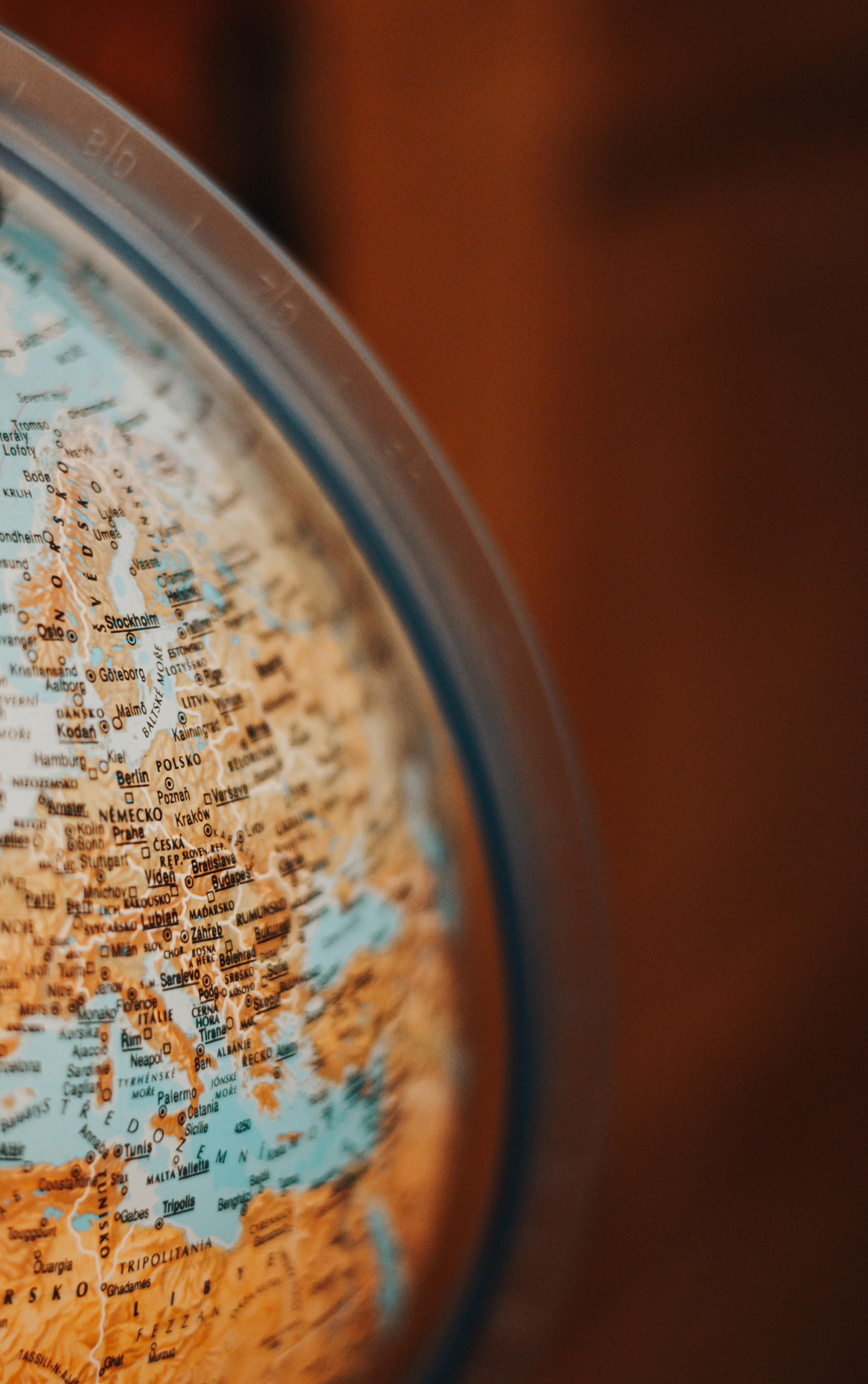
“As a Waqifeen -e-Nau it is imperative to prioritise our faith over worldly matters and to increase our levels of sacrifice.”
Maryam | 31
Challenges OF MOTHERHOOD
During a virtual mulaqat with Hazrat Mirza Masroor Ahmad,

Masih
a mother mentioned the challenges she faced raising her young child. She said that having a small child often left her exhausted and she sought the guidance of His Holinessaba in this regard.
In response, Hazrat Mirza Masroor Ahmadaba said:
“Even if you find it difficult, you should not express your anger at your child or take out your frustration upon her. Rather, you should explain to the child that you are tired and you are going to rest and reassure her that you will play with her afterwards. Children are naturally intelligent and they do understand. You can even tell her that you are tired and so she should press your legs or massage your head and the child will begin to enjoy that too. In this way you can guide and train her but do not show anger, do not shout and do not say anything negative to them.”
Khalifatul
Vaba,
Maryam | 32
The mother who asked this question also enquired what prayer she should recite in order to best control her emotions, upon which His Holinessaba said she should recite Durood Shareef – invoking blessings upon the Holy Prophet Muhammad (peace and blessings be upon him).
O Allah, Bless Muhammad and the people of Muhammad, as Thou didst bless Abraham and the people of Abraham. Thou art indeed the Praiseworthy, the Glorious.
O Allah, Prosper Muhammad and the people of Muhammad, as Thou didst prosper Abraham and the people of Abraham. Thou art indeed the Praiseworthy, the Glorious.
https://www.pressahmadiyya.com/press-releases/2021/02/waqf-e-nau-girls-and-women-frombangladesh-have-honour-of-a-virtual-meeting-with-the-head-of-the-ahmadiyya-muslim-community/
تیلص اک دمم لا لعو دمم لع لص مھللا دیم دیح کنا �ھا�ا لا لعو �ھا�ا لع تک ر� اک دمم لا لعو دمم لع کر� مھللا دیم دیح کنا �ھا�ا لا لعو �ھا�ا لع
Maryam | 33
Roles and Responsibilities of Waaqifaat-e-Nau Mothers
 Salma Manahil Malik
Salma Manahil Malik
Growing up I would always hear the words from my mum: “When you become a mother one day, you will realise…”, and actually these words have continued to echo in my thoughts. The reality is that you only realise the responsibilities of a mother when you become one. As cliché as it may sound, it is at this point that you begin to truly understand the status and position of a mother, which Islam has beautifully mentioned through a famous hadith when a man once asked the Holy Prophetsaw: “‘Who among the people is most deserving of a good treatment from me?’ Hesaw said: ‘Your mother’. He again said: ‘Then who (is the next one)?’ Hesaw said: ‘Again it is your mother’ (who deserves the best treatment from you). He said: ‘Then who (is the next one)?’ He (the Holy Prophetsaw) said: ‘Again, it is your mother’. He (again) said: ‘Then who?’ Thereupon he the Prophetsaw said: ‘Then it is your father’.”
(Sahih Muslim, Kitab Al-Birr)
The upbringing and moral training of our children is one of the biggest tasks we will encounter. And seeing the degradation and decline in moral values of the society and environment around us, this makes our task that much harder; and it is only the sheer grace of Allah the Almighty and the prayers of our Khalifa that our children are able to stay away from the ever-increasing evils of society.
The word ‘Waqf’ means devotion, therefore if we apply it to our roles as Waaqifaat-e-Nau mothers then it is our responsibility to try our best to fulfil this task with great devotion. Our Waqf starts at home where we have to sacrifice everything in order to provide the best upbringing for our children. In my view, a mother is the ultimate embodiment of sacrifice; she sacrifices everything for her children so they have the very best. This is encountered in our day to day lives where we forget ourselves and essentially live for our children. Hence our sacrifice should be such that we are able to present the next generation of Waqf-e-Nau children in a way that they become beautifully wrapped in the best Islamic values and decorated with the best moral values and then and only then will our sacrifice be meaningful.

Maryam | 34
Inculcating the Love of Allah
The importance of inculcating the love of our creator is pivotal in the upbringing of children and it should be one of the first building blocks of a child’s primary moral training. It is evident that children learn by example and our actions and thoughts are imitated by our children, we experience this day in and day out. The very first lessons of a child’s life will be those that they observe in their surroundings. For example many of us will see our children bow down in prostration imitating the actions of salat. For that child it may be a meaningless action, but as a mother it is a reassurance that they are observing and learning.
On one occasion I saw my daughter, who at the time was not even two years old, imitating the physical motions of salat; when she sat to recite tashahhud (after the two Sujood) she raised her finger as one would at the point of shahadah. It amazed me that such a young child was giving such attention to detail, but then at the same time it reminded me that children are sponges, they soak in everything from their surroundings. This was most certainly a proud moment for a mother but at the same time it was also a reminder that my daughter was learning from me, her first teacher!
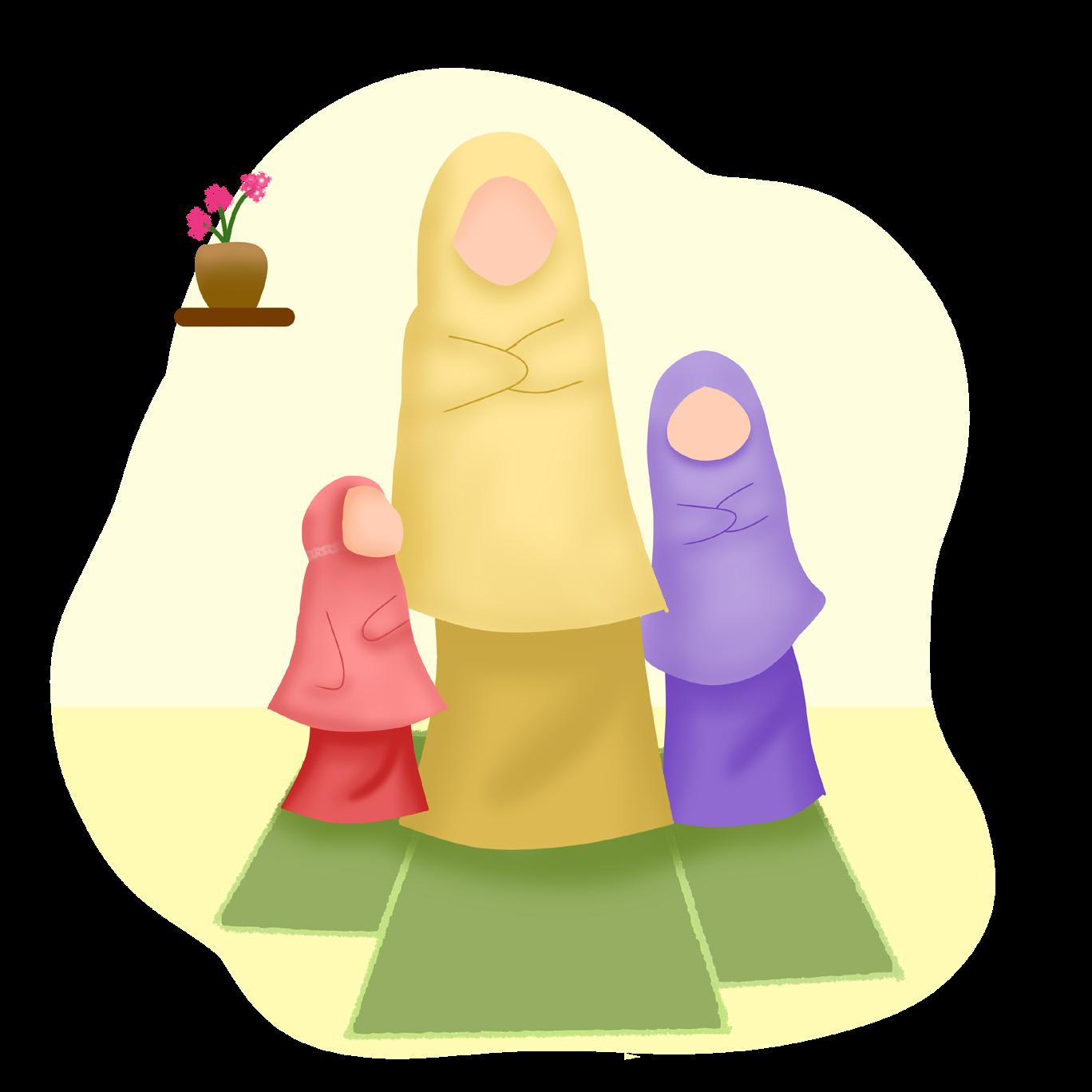
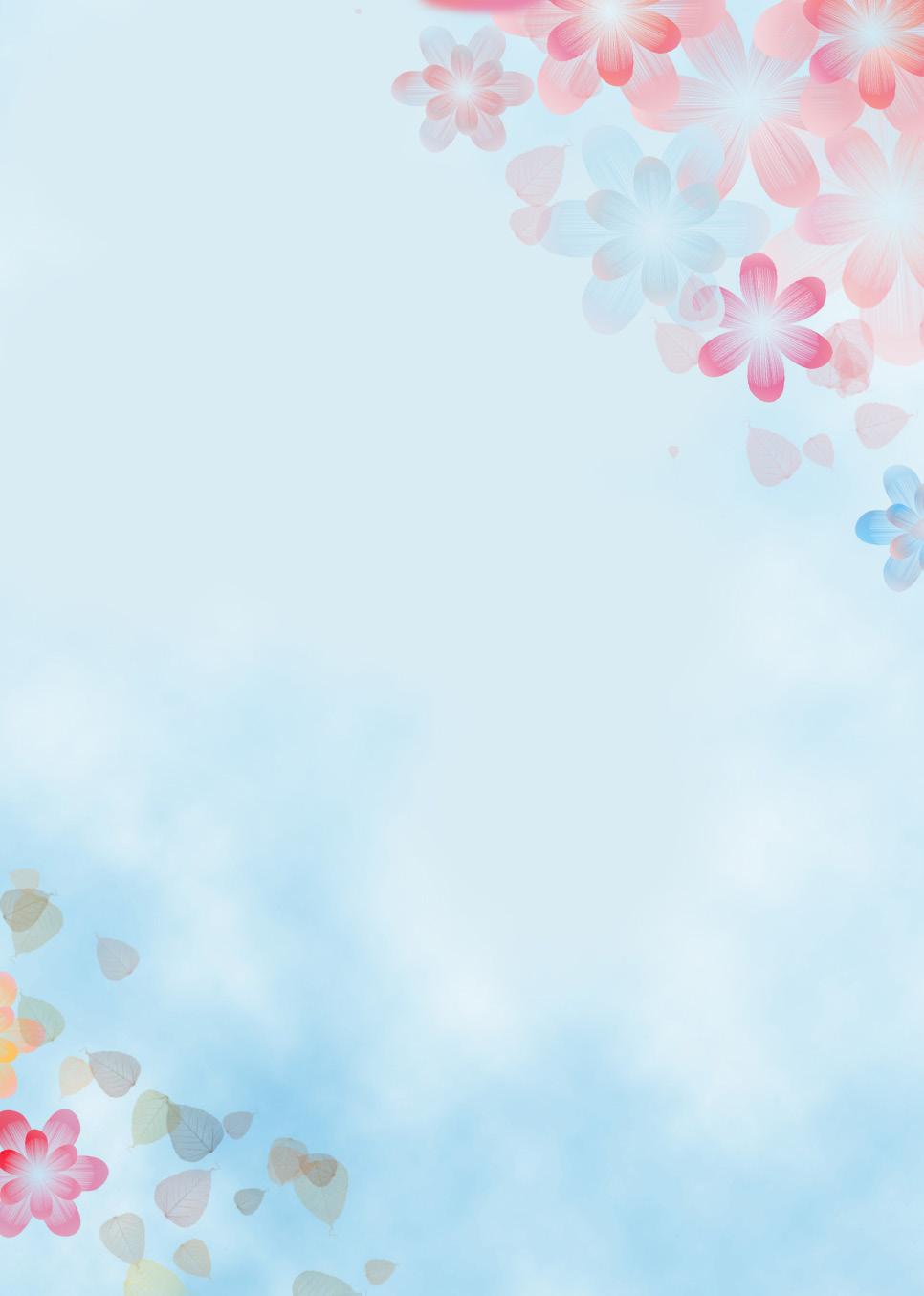
And hence love of Allah the Almighty is something that will be inculcated at home, by remembering Him in every aspect of life, reminding the children to be thankful for every blessing that He has bestowed upon them, and to bow down to Him in prostration and asking Him for help.
One thing I have really realised is that children find it very difficult to perceive Allah the Almighty, and they will question His existence merely on the fact that they are unable to see Him. Just a few days ago I was in conversation with my two-and-a-half-year-old daughter who received something that she really liked, so I told her that ‘Allah had given her this’ to which she instantly replied ‘where is Allah?’, I replied ‘He is everywhere’ she stared looking all around her! Then with great force she replied ‘No He is not’, simply because she did not physically see anything. I then drew her attention to the snow outside, I said to her whether she knew where it came from, to which she replied ‘mama made it’, I then explained to her that I was inside and would not be able to make it ever. This got her thinking!
Whenever I have encountered such situations with either of my children it always takes me back to the Waaqifat-eNau class with Hazur-e-Aqdasaba in which he most beautifully explained the verses of a Poem of Hazrat Nawab Mubarka begum sahibara Mujeh deekh talibe muntazir. The verses most eloquently explain that to see Allah the Almighty you need to have the adequate vision because His existence is reflected in all of His creation around us. And as a mother it reminds me that they will only truly be able to see Allah the Almighty if they develop this vision, and they will only be able to do this if they have firm faith in His existence!
Hence, inculcating the love of Allah the Almighty is essential for our children to see the light in this very dark world, because without this they will be enveloped in the evils of
Maryam | 35
this world. May Allah enable them to always see the light of Allah the Almighty, Ameen! Hazur-e-Aqdasaba once stated: “Allah the Almighty has called upon us to pray. It is a sign of such people who pray:

‘Our Lord, grant us of our wives and children the delight of our eyes, and make us a model for the righteous.” (Holy Quran 25:75)
This prayer will not only keep you steadfast on the path of righteousness, but will also safeguard your progeny from the evils of this world and guide them towards righteousness. This prayer will also be in favour of those women who complain that their husbands do not maintain an affiliation with the faith and are irregular in the daily prayers. Allah will indeed listen to the prayers generated from the depths of our heart. Do not think that only men are the leaders of the righteous people. Every woman who prays for her child and tries to inculcate in her future generations the spirit of bonding with Allah, [encourages] the act of prostrating before Him and [encourages] remaining steadfast on the path of righteousness will endeavour to be the leader of the righteous ones. As a caretaker of her house, she is an Imam [leader].” (AddressbyHazratMirzaMasroorAhmad,KhalifatulMasihVaba at Lajna Ima’illah Annual Ijtema 04 November 2007 UK at Baitul Futuh Mosque, London. Published Al Fazl International 09 December 2016)
Inculcating the Love of Khilafat
We as Waaqifaat-e-Nau mothers have a much greater task, that we become great role models for our children and that we give them the foundations of great moral training from a young age; and that we continue to make our homes a heaven for them to grow in and become the helping hands of our beloved Khalifa and the warriors of Islam Ahmadiyyat. But no doubt this task becomes extremely daunting and difficult at times, especially when dealing with a six-year-old throwing a tantrum and a two-year-old screaming down one’s throat for attention. During these episodes, I close my eyes and recite Durood Shareef, take a few deep breathes and reflect over the beautiful advices of our Khalifa.
The blessings of Khilafat are one which we could never be thankful enough for, Allah has bestowed upon us this means of providing continuous advice and reminders of ways for us to grow closer to Him. The importance of inculcating the love and absolute obedience to Khilafat is integral in the upbringing of children. Effectively, obedience to the Khalifa is obedience to Allah the Almighty, hence why it is important to inculcate this within children from a young age.
Pearls of wisdom by Hazrat Khalifatul Masih Vaba on the moral training of children
The following are a few excerpts regarding the moral training of children from our beloved Hazur-eAqdasaba, which are important reminders for us to go through routinely: Hazur-e-Aqdasaba was asked by a Waqifa-e-Nau about how she could train her children to become good Waqf-e-Nau in the future. Hazur-e-Aqdasaba replied:
“The first thing is that you pray for him in your five daily prayers, and offer two rak’at nafal [voluntary prayers] for Allah the Almighty to make him a true Waqf-e-Nau. And as he grows up, teach him about good morals and the teachings of the Holy Qur’an. And show your own example, both husband and wife should set their own example before their children so that they would know that our parents are always offering the five daily prayers, they read the Holy Qur’an, they try to understand the meanings of the Holy Qur’an, they are the thorough example of the teachings of the Holy Qur’an and Islam and that they are true followers of Islam Ahmadiyyat, then they will grow up in that atmosphere and environment and they will become a good Waqf-e-Nau.” (MTA International, This Week with Huzoor – USA 2022 Tour Special [Part 2])
اماما نیقتملل انلعجاو نیعا ۃرق انتیرذو انجاوزا نم انل بہ انبر
Maryam | 36
“There is no doubt that the tarbiyyat of children is not an easy affair and especially in this age, where at every turn attractions created by Satan entice us in various ways. A true believer is indeed expected that being attached to Allah the Almighty, he should save himself as well as his children from the onslaughts of Satan, instead of giving in to despair and negative feelings while being frightened. A harrowing example of negative thinking, came before my eyes when a person wrote to me that given the prevalent immorality in the world today and the state of the general moral depravity, I would choose to not have children after I get married. This is an extremely pessimistic view. This is akin to accepting defeat from Satan, taking Satan as the final authority and acting as though Allah the Almighty has no power to save us and our children from the onslaughts of Satan, regardless of how much effort we exert and prayers we offer. In other words, this is like granting absolute freedom to the followers of Satan, leading to annihilation of the progeny of believers in due course. Hence, this way of thinking is extremely disappointing and does not behove the followers of the Promised Messiahas. In order to partake in the revolution for which the Promised Messiahas was sent to the world by Allah the Exalted, we must use our capabilities and faculties to the utmost and we must also infuse this spirit into our offspring. We must pray for our objectives and bring our children up [in a manner] so that despite all of the filth and indecencies found in the society, we will not allow Satan to be victorious, Insha’Allah [God willingly]. We must endeavour to establish the Kingdom of God on this earth. Thus, there is no need to be disheartened. Rather, we must act in accordance with the prescribed path by Allah the Exalted with determination.” (Friday Sermon, delivered by Hazrat Mirza Masroor Ahmad, Khalifatul Masih Vabaon July 14th 2017)
“You should focus on your own moral training (Tarbiyyat), then this will consequently result in his moral training as well. Offer your daily prayers, so he is aware that his parents offer their prayers. Recite the Holy Qur’an so he knows that his parents recite the Holy Qur’an. Have religious discussions in your home so he knows that religious discussions take place in his home. Do not watch useless films and dramas on the television, so he knows that vain films and dramas are not watched in his home because such things are wrong. Use your time wisely; focus on reading books and watching other [informative] things so that they can learn. There are many other virtues, and if you adopt them, then your children will learn that they must also do the same things. Familiarise them with the Jama’at and tell them about the teachings of the Promised Messiahas; tell them of the teachings of the Holy Prophetsaw; talk to them about Allah the Almighty. If you have these sorts of discussions, then he will be brought up in a religious atmosphere; this is true moral training. If you watch useless films late into the night and tell your children that it is late and they should go to sleep, and that children are not allowed to watch the film that we are watching on TV after 11 pm, then this will not allow for their proper moral training.” (https://www.reviewofreligions. org/36189/rays-of-wisdom-for-the-modern-world-part-18/)
“The Promised Messiahas states: ‘… one should also pay heed towards children’s moral reformation. Allah the Almighty has created man so that he may worship Him, just as Allah the Almighty states: ‘And I have not created the Jinn and the men but that they may worship Me.’ However, if one does not become a Momin [believer]; and does not devote himself to the servitude of God; and does not fulfil the true objective of his creation. … Thus, until one does not desire for a progeny which is religious, full of piety and serves faith while displaying complete obedience to Allah the Almighty, such a desire is completely futile, in fact it is a form of sin.’” (Friday Sermon, delivered by Hazrat Mirza Masroor Ahmad, Khalifatul Masih Vabaon July 14th 2017)
“Nevertheless, as I have already mentioned previously, the parents of Waqifeen-a-Nau children should pay special attention towards the moral training of their children and alongside this they

............................................
Maryam | 37
must pray for them to achieve this goal; for their children to grow up to serve the faith in a manner whereby they give precedence to faith over all worldly pursuits. Thus, everyone should pray for their children to become righteous and develop a pure nature. The Promised Messiahas states: ‘The succour of God Almighty descends only upon those people who excel in virtuous deeds and do not remain at one station. These are the people who have a prosperous end.’ In order for one to receive a prosperous end the Promised Messiahas stated: ‘One should pray constantly for oneself, as well as their wife and children.’ (Friday Sermon, delivered by Hazrat Mirza Masroor Ahmad, Khalifatul Masih Vabaon July 14th 2017)
“The prayer of Zachariah is mentioned in Surah Al Anbiya of the Holy Qur’an – My Lord, leave me not childless, and Thou art the Best of inheritors. (Al-Anbiya’ 90). Since God Almighty has been called the ‘Best of Inheritors’, it is clear from this prayer that one should not pray to be granted offspring that can become their heirs in their worldly affairs, but instead such heirs be granted from God Almighty who give preference to their faith over the world. The desire to have children is a legitimate desire, but on top of that one must also pray for pious heirs. The Promised Messiahas in one place states: ‘The trial surrounding children is a great trial indeed. If the children are righteous then why should one worry? God Almighty Himself states: God Himself becomes the Friend and Protector of the righteous.’” (FridaySermon,deliveredbyHazratMirzaMasroorAhmad,KhalifatulMasihVaba on July 14th 2017)
Motherhood is by no means an easy task, but it is certainly one of the most rewarding duties. During this journey there are many ups and many downs and we are fortunate to have beloved Hazur’saba continuance guidance. May Allah the Almighty enable us to inculcate these invaluable pearls of wisdom from Hazur-e-Aqdasaba into our lives and may Allah bless our efforts in striving to raise our children to the highest moral standard and accept our humble prayers. Ameen.
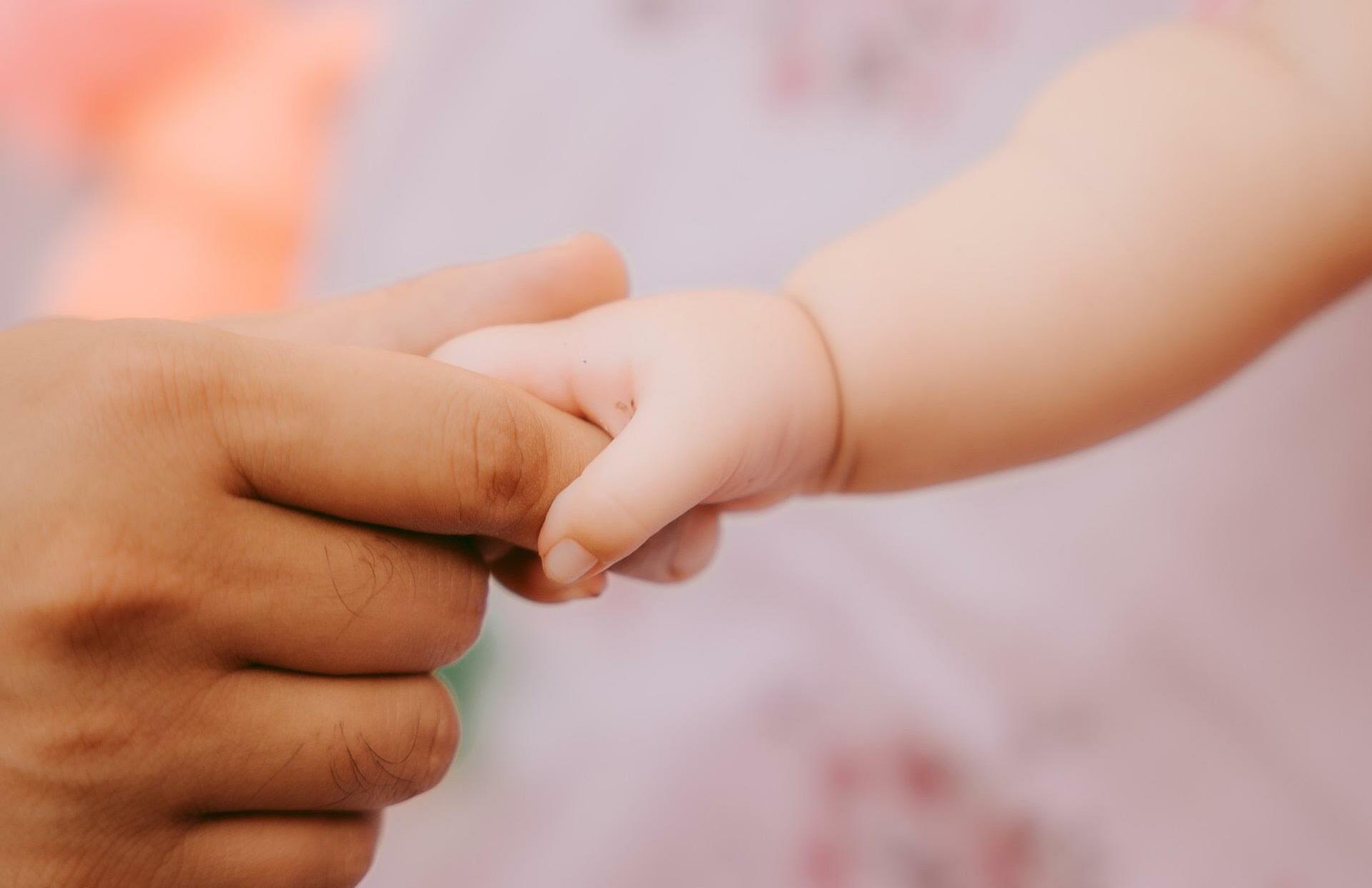

Maryam | 38
LAUGHTER IS THE BEST MEDICINE
“The Clever Doctor”
Once upon a time there was a wise doctor who got tired of his daily routines. He wished to be entertained while working. So, one day he decided to put up a sign in front of his clinic. The sign read: “if I can cure you, you pay me £20, but if I cannot cure you, I pay you £100”.

A greedy lawyer read this sign and thought to himself “I can earn £100 easily”. He walked into the clinic and started complaining to the doctor “I cannot taste anything anymore, please cure me! The doctor looked at the lawyer and asked his nurse to bring him a medicine from the top drawer of his desk. The lawyer gulped at the medicine and gasped in disgust. He quickly spat out the medicine and cried “That’s vinegar!!” The doctor looked rather pleased and said “you are cured! That would be £20 please”. The lawyer paid and left rather frustrated. His anger made him want to return to the clinic with revenge.
Determined to make the doctor pay him £100 the lawyer returned to the clinic the next day. “Doctor, Doctor, I am feeling so helpless. I need you to cure my memory loss” exclaimed the lawyer with a smirk on his face. “Very well then” replied the Doctor. “Nurse, could you kindly bring me the medicine from the top drawer of my desk please?” said the Doctor. “No way!” exclaimed the lawyer, “that’s the medicine you gave me yesterday!” The Doctor smiled pleasantly and demanded “gentleman your memory is fixed! Consider yourself cured. That would be £20 please”. The lawyer paid the money and stomped away displeased.
The next day the lawyer returned to the clinic with a fool proof plan. He stormed into the doctor’s cabin calling for help. “Doctor, Doctor, I’m blind, please cure me”. The Doctor stood up from his desk and replied “I’m terribly sorry but I cannot cure blindness. Here’s your £100” and handed him a £5 note. The lawyer felt really enraged and started to scream “Hold on a second Doctor! That’s only £5!”



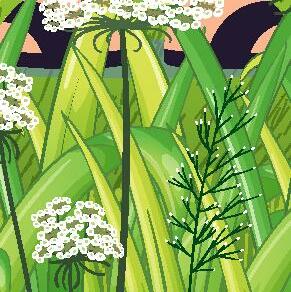





















































































































































“Blindness cured! That would be another £20 please” replied the Doctor smilingly. The lawyer paid the money to the Doctor and decided never to come back to the clinic again.
Moral of the story: Lying never gets you far in life!
Maryam | 39
Experiencing the Blessings of Khilafat and Acceptance of Prayer
Mariya Rana
Dear Waqfe Nau readers, there is no doubt that Khilafat is truly a gift from Allah the Almighty and is a strong rope, which we must hold on to. Only then, by obeying God’s commandments, can we truly benefit from these heavenly blessing.
Hazrat Mirza Tahir Ahmad, Khalifatul Masih IVrh said: “Bind yourselves with Khilafat till the Day of Resurrection with such firmness as if you have got hold of a strong handle that is never destined to break […]. Thus, if you have a [strong] relationship with Khilafat, it will most certainly remain with you, and it is this mutual accord alone that shall ultimately result in the [spread of] tawhid [Oneness of God].1
Hazrat Mirza Bashiruddin Mahmud Ahmad, Khalifatul Masih Ira said: “Be exceedingly mindful of the fact that Khilafat is Hablullah [the rope of Allah]. It is such a rope [of God] that holding fast to it alone will lead you to progress. The one who will let go of it will be destroyed.”2
We must strive to ensure that we have a strong connection to Khilafat. We must try to act upon all the advice and instructions from our beloved Khalifa.
What is the fundamental advice that beloved Hazuraba , Hazrat Mirza Masroor Ahmad, Khalifatul Masih Vaba, gives to all Ahmadis?
That is to observe all five daily prayers on time. This is an excellent way to achieve nearness to Allah and purify ourselves from sins. Hence, if we are striving to obey all of God’s commandments, only then can we claim to have a strong connection and love for Khilafat.
Shedding light on this matter, Hazrat Khalifatul Masih IVrh said: “The relationship of every Ahmadi with the Holy Prophet Muhammadsaw and his Khulafa or the Promised Messiahas and his Khulafa, should be based on the relationship of Allah. If the foundation of their relationship is not built on the relationship of Allah, then this relationship is artificial, fake and meaningless. If the love of Allah gives rise to that relationship and as they grow in their love for Allah, the said relationship with the Holy Prophets [and others] also grows, then rest assured that such people are not in any kind of danger, neither in this world nor in the next. Those who possess this kind of relationship, as I have explained, will remain safe from every strife.”3 (Friday Sermon, 23 November 1990).
As Waqfe Nau we too also must be role models for others. Having a strong connection to Khilafat has many blessings; writing letters to beloved Hazuraba and requesting for prayers in all our matters is a way of building that connection.
I myself have experienced the blessings of Khilafat - during times in which I was stressed and also during times when everything was well, I wrote to my beloved Hazuraba and sought comfort, guidance and prayers.
After the COVID pandemic lockdown, I was due to start my GCSE course. Like everyone else I was also increasingly anxious about how I would cope with the stress of exams and the increased
Maryam | 40
workload of so many subjects. At the start of the academic year, I was disappointingly placed in the lower sets, despite being in the higher sets in the previous years, this was due to the fact that proper assessments could not be conducted due to the pandemic. Coming home I immediately wrote a letter to my beloved Hazuraba explaining my situation and requesting for prayers for my academic success.
Furthermore, I also started praying for my success and resolved to work hard. I received a reply back from beloved Hazuraba full of prayers and guidance, this was a source of comfort for me during my assessments because I knew that as long as I put the effort in, with Hazur’saba prayers, Allah the Almighty would support and help me in my matters. Near the end of the second term, I anxiously awaited as my teacher started handing out our marked assessment papers. As the teacher reached my table and handed out my paper she stopped and announced that I had achieved the highest marks in my class and that I would be moving into the top set in my year. Stunned upon hearing this news, I then realised that this was solely due to beloved Hazur’saba prayers for me and Allah the Almighty’s favour upon me. Upon arriving back from school, I immediately wrote a letter to Hazuraba in which I relayed this good news and thanked him for his prayers and guidance.
Further on in my second year, my final GCSE exams were fast approaching and I was nervous about handling the stress of the 32 exams coming up. I wrote to beloved Hazuraba time and time again for prayers and guidance on all matter including what the best method to revise was and how I should prepare for my upcoming exams.
I would like to share one piece of advice which my beloved Hazuraba gave to me in response to my questions and I hope and pray that all will benefit from this. That is: “Pray to Allah Almighty and work hard to prepare for your exams. Insha’Allah you will be successful.”
In these illuminating and comforting words, I understood that Allah the Almighty has the power to do everything and so I should seek His help whilst I revise for my exams and constantly put my best effort in and leave the rest up to Allah.
My exams were due to start on 16th May and were to end on 23rd of June. The day before my exams were due to start Allah the Almighty blessed me with the opportunity to attend the Waaqifaat-e-Nau Lajna Virtual Mulaqat with beloved Hazuraba in Baitul Futuh Mosque. I had the honour of being able to request prayers from beloved Hazuraba for my exams. From then on, a part of me knew in my heart that Insha’Allah I would be successful in my GCSEs. Alhamdulillah I was able to get through all my exams successfully despite the fact that on some days I had 3 exams in one day. After the exam season I was left tired but glad that the exams were over.
I awaited my results, still seeking beloved Hazur’saba prayers. At last, the results day arrived; I received my result envelope and the sight which greeted me left me overwhelmed with emotions. Alhamdulillah, I achieved top grades, which were higher than my expectations. These results proved to me once again that Allah the Almighty had most certainly helped me in my exams and these blessings were the fruits of the prayers of Khalifatul-Masihaba. Dear readers, I finally leave you with this lesson that I had learnt from my experience that Khilafat is truly a gift from God which is to be treasured and loved. We should pray to Allah Almighty for beloved Hazuraba and as Waqfe Nau we must work hard to listen and obey every instruction that beloved Hazuraba gives us so that Allah enables us to fulfil our Waqf and our pledge to the Jama’at in the best possible manner. May we become the true Waqifaat who bring about a revolution in the world. Ameen
1 Nizam-e-Khilafat, Barakat aur Hamari Zimadarian, p. 78
2 Nizam-e-Khilafat, Barakat aur Hamari Zimadarian, p. 77
3 Friday Sermon, 23 November 1990
https://www.alhakam.org/the-significance-of-building-a-strong-relationship-with-khilafat/
https://www.alhakam.org/the-significance-of-building-a-strong-relationship-with-khilafat/
https://www.alhakam.org/the-significance-of-building-a-strong-relationship-with-khilafat/
Maryam | 41
THE LIFE AND CHARACTER of the Seal of Prophets
(Peace and Blessings of Allah be upon him)
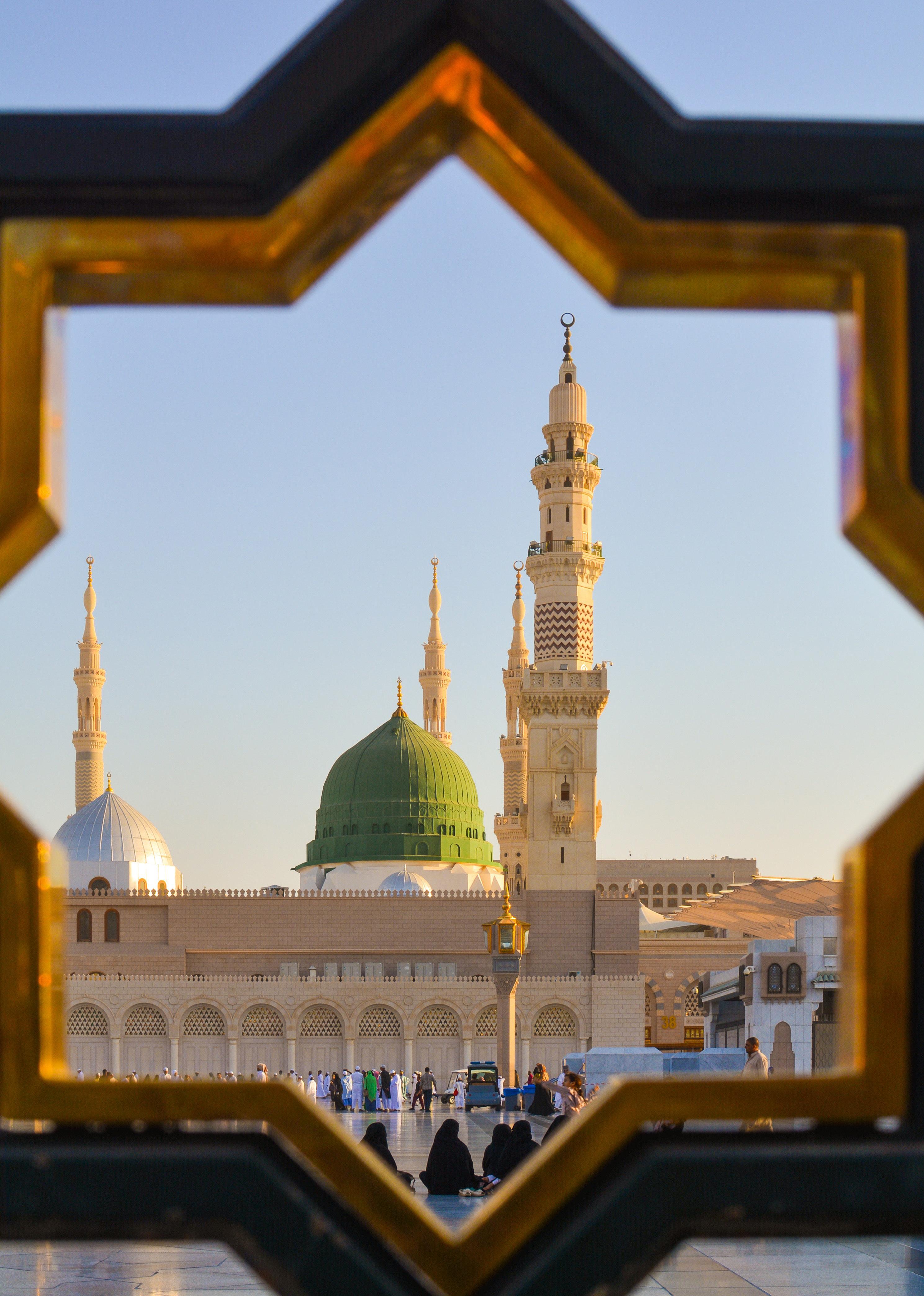
Maryam | 42
Desire of the Holy Prophetsaw to Reconcile Rejects the Notion of Compulsion
Another proof that these wars of the Holy Prophetsaw were not for the purpose of converting people to Islam by force, is that he would always desire reconciliation. The utmost effort of the Holy Prophetsaw would be to somehow bring these wars to an end, so that a state of peace and security could be brought about in the land. As such, history proves that upon the occasion of the Treaty of Ḥudaibiyyah, the Quraish stipulated the most severe of terms, to the extent that a majority of the Muslims considered the acceptance of these conditions to be a disgrace upon themselves. However, the Holy Prophetsaw was not bothered by any of this, and as the Quraish demanded, he accepted their conditions and came to a truce. Now this is an instance which calls for contemplation, for if the purpose of the Holy Prophetsaw in these wars was to convert the disbelievers to Islam by the dint of the sword, the state of affairs would have been different. The Quraish would have pressed for reconciliation and proposed such soft conditions as would be happily accepted by the Muslims. The Holy Prophetsaw would have in turn followed a course of rigidity and made excuses to avoid a proposal of reconciliation, continuing to spur on war, so that an opportunity for the forceful conversion of disbelievers to Islam, would remain available. However, at this instance, the matter appears to have been the opposite. This conclusively proves that the heartfelt desire of the Holy Prophetsaw was that by some means this war should
be stopped and a prospect of peace and security should prevail, throughout the land. Furthermore, the Qur’anic verse which was revealed on this occasion is also a proof that the objective of the Holy Prophetsaw in these wars was not forceful propagation, rather, the establishment of peace. As such, a narration in Bukhari states that the following Qur’anic verse was revealed at the occasion of the Treaty of Ḥudaibiyyah:
“We have granted you a manifest victory.” (Al-Fath 48:2)
In other words, Allah the Exalted has referred to reconciliation and the establishment of peace as a manifest victory for the Muslims. In truth, the Treaty of Ḥudaibiyyah was such an extraordinarily magnificent victory, that in a way, the Battle of Badr and the Battle of the Ditch equate to nothing. The reason being that although the disbelievers were defeated and put to flight at the Battle of Badr and the Battle of the Ditch, the Muslims did not attain the objective of their Jihad in these wars, because the disbelievers were still in conflict just as before and war continued. However, at Ḥudaibiyyah, although there was no massacre and carnage and apparently the Muslims were made to give in to this treaty, but the purpose of their Jihad was ultimately attained. In other words, war was ceased, and peace was established in the land. Hence, the Treaty of Ḥudaibiyyah was the true victory, and it is for this reason that Allah has referred to it as a ‘Manifest Victory’. This is a remarkably outstanding proof that the wars
جو پر قعمو سیا پھر ۔ہو اپید ترصو کی نمااو منا میں ملک ںئیوالڑ نا کہ ہے تثبو کا تبا سا بھی ہو ئیہو لزنا یتآ مقیا بلکہ تھی نہ تبلیغ یجبر ضغر کی سلمو علیہ للہا صلی تنحضرآ یربخا نچہچنا ۔ تھی 1 میں نیآقر یتآ یہ کہ ہے تیآ یتاور کہ ف انيبم احتف كل انحت ‘‘ 2یعنی فتح کھلی کھلی یبڑ یکایہ تجھے نے ہم لیٰتعا للہا یاگو ۔ تھی ئیہو لزنا پر قعمو کے ہی یبیہحد صلح ۔ہے ہے کھار فتحکھلی کھلی یکا لئے کے ںنومسلما منا کامنا مقیا روا صلح جس تھی فتحنلشااعظیم یتنہایکا یبیہحدصلح کہ ہے یہبھی حق Maryam | 43
of the Muslims were either defensive or for the establishment of peace, and not for the purpose of spreading Islam by force.
Muslims Achieved Exceptional Progress During a Time of Peace
This question may be analysed from another perspective as well and that is to determine whether Islam achieved more progress during a time of peace or in a time of war. If it is proven that in comparison to war time, Islam progressed at an extraordinary speed during a time of peace, this would furnish practical evidence to substantiate that the wars of Islam were not for the purpose of forceful propagation. History identifies that war practically began in the second year of migration, and the Treaty of Ḥudaibiyyah took place in the sixth year of migration. In other words, prior to the Treaty of Ḥudaibiyyah, the Muslims underwent a five-year period of war. The number of Muslims in the span of these five years can be estimated by the number of warriors who participated in these wars on behalf of the Muslim army. War was announced in Ṣafar 2 A.H., and the first battle of the Muslims against the Quraish took place in Ramaḍan 2 A.H., at the occasion of Badr, where the Muslims numbered just over 300. The second battle took place in Shawwal 3 A.H., at the occasion of Uḥud, where the Muslims were 700 in number. The third battle was in Shawwal 5 A.H., which is known as the Ghazwah of the Confederates or the Ghazwah of the Ditch. In this war the Muslims were 3,000 in number. However, it should be remembered that since this battle took place in Madinah, a larger number of Muslims
were able to participate. For if this had been a distant journey, perhaps so many Muslims would not have been able to participate, because the weak, old and destitute would have been left behind in large numbers. In any case, 3,000 Muslims participated in this war. After this, in Dhū Qa‘dah 6 A.H., the Ghazwah of the Treaty of Ḥudaibiyyah took place, in which 1,500 Muslims participated. Thus, in the last Ghazwah of this four-to-fiveyear period of war, the Muslim population went from 300 to 1,500, and if the number at the Ghazwah of the Ditch is made a basis, it can be said that this population touched 3,000. After this, an era of peace began, which lasted for approximately a year and three quarters. However, the astonishing speed at which Islam progressed in this era of peace can be discerned from the number of Muslims present at the Ghazwah of the Victory of Makkah, which took place in Ramaḍan 8 A.H. Historians agree that the number of the Muslim army in this Ghazwah comprised of 10,000 souls. Hence, in a four to five year period of war, the number of Muslims who were able to partake in Jihad had reached 1,500, or at most 3,000, but in an era of peace spanning a year and three quarters, this number reached 10,000. This proves that these wars were not for the purpose of forceful propagation, rather, they were actually a hindrance in the progress of Islam. The reason being that as soon as this war came to an end, Islam began to spread rapidly. In actuality, during a state of war, many people were unable to pay due attention to Islam. Many people of weaker dispositions feared the opposition of the disbelievers as well, and even Muslims
Maryam | 44
themselves found very little opportunity for actual preaching, due to their engagement in war. However, when war ceased, on the one hand, people received an opportunity to reflect upon Islam and the fear of weaker dispositions, was relieved. On the other hand, preaching efforts took on pace, and the result of this is before us.
The Life & Character of the Seal of Prophetsaw – Volume II by Hazrat Mirza Bashir Ahmad, M.A.ra, p.49-51
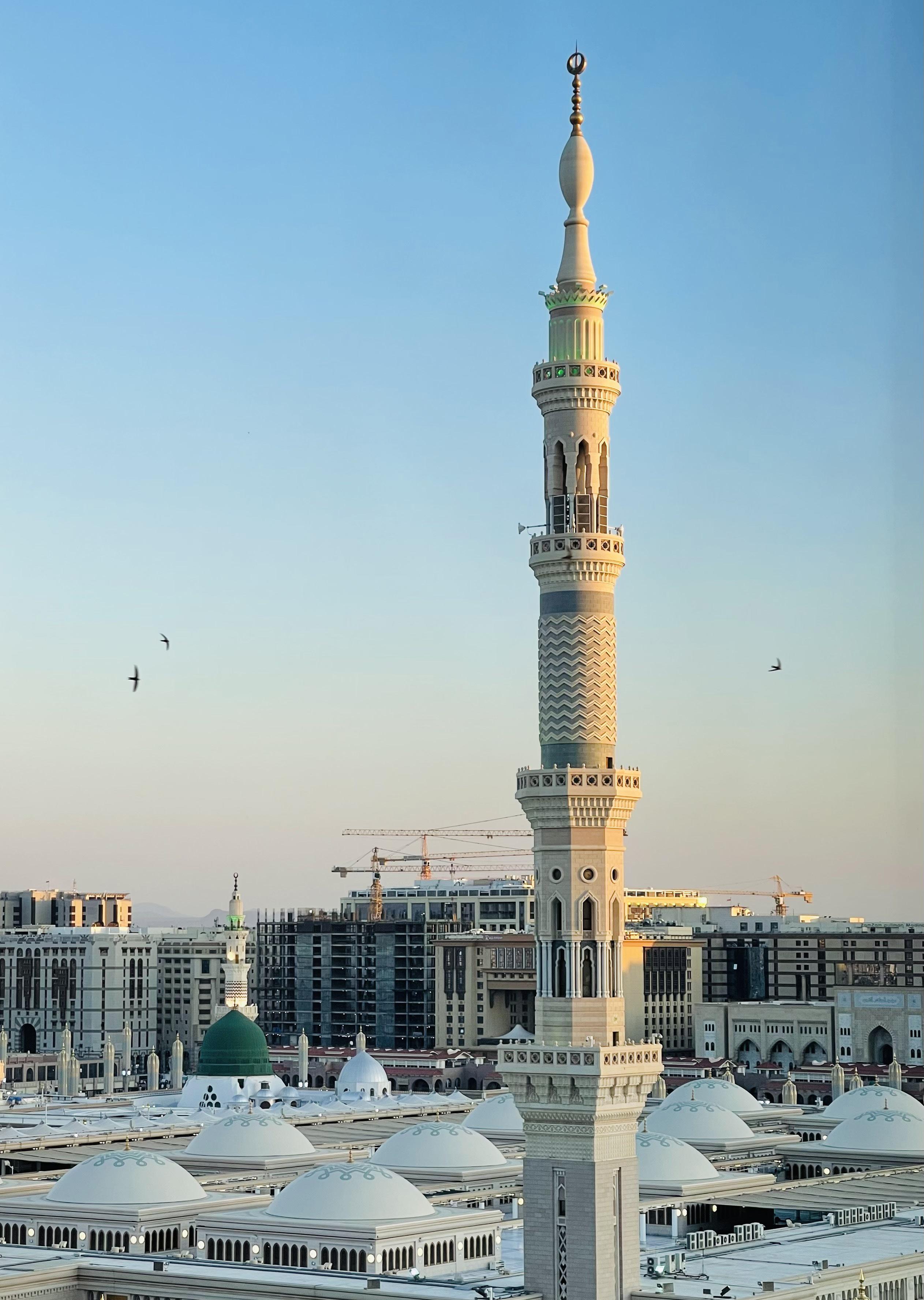
Maryam | 45




 Hazrat Mirza Masroor Ahmad, Khalifatul Masih Vaba, Jalsa Salana Qadian, 25th December 2022
Hazrat Mirza Masroor Ahmad, Khalifatul Masih Vaba, Jalsa Salana Qadian, 25th December 2022

































 By Amtul Noor Mahmood
By Amtul Noor Mahmood


 Salma Manahil Malik
Salma Manahil Malik


































































